#already knowing the thematic value of a death yet to come
Explore tagged Tumblr posts
Text
love a character just absolutely covered in death flags. you never stood a chance but i love to see how long you’ll last and what will be the final straw. love to see a death get more poignant and jarring the more inevitable it feels
#buzzing in my seat#already knowing the thematic value of a death yet to come#just waiting to cash that in
10 notes
·
View notes
Text
Undead Unluck ch.231 thoughts
[Do You Remember~ The 17th Night of November~]
(Topics: criticism - pacing/narrative focus, character analysis - Gina/Feng/Julia/Billy, speculation - Soul/Ruin)
Juggling Glass and Rubber
Damn, Tozuka, you weren't lyin', that Unjustice can sweep the Master Rules!
I'll admit I am a little disappointed by this turn of events because, like I was saying the last several weeks, I expected there to be an extra wrinkle that kept Unjustice from trivializing all of the MR fights, especially the ones that hadn't actually happened yet!
Yusai I was always pretty shaky on, and since she never got much characterization going in, I'm not exactly surprised, but the rest were definitely bummers
I've said before that I'm fine with skipping the Sick fight since Rip and Latla's climax already happened, but it's not like there was nothing to be done with it, like focusing on Sick's desire for revenge or having Rip look back on the mistakes he made in L100
Same thing with Billy and Tatiana's reunion - technically the climax of their joint arc was at the end of L100 when they promised to stay by each other's side until death, but I always thought of that as the setup to an upcoming payoff, not the payoff itself. It's definitely still salvageable here, but I think having Tatiana come in to save Billy when he's having trouble would have felt a lot more cathartic if it was focused on and analyzed rather than just...happening. Some insight as to why Billy was having trouble using Unjustice, like perhaps being overloaded with too many new Rules or reconciling with the choices he'd made, would have given Tatiana something internal to save him from as well as something external
I guess my issue here is that we're not really getting to see the effects that Remember is having on the cast as a whole, which I think would have better served as the focus here. I don't know if it's that Tozuka has been given a set number of chapters to work with by Jump or what, but it seems likely that Tozuka had ideas for how he wanted to execute everyone's arcs and fights but had to prioritize who to give the lion's share of the focus to for the sake of maximizing narrative impact
Case in point, the characters who he did manage to analyze here each had a pretty unique interaction with Remember
Remember Who You Are
Despite how brief their scenes are here, I do think that Gina and Feng's moments illustrate Remember's value remarkably well
Gina starts referring to everyone by the old nicknames she used for them in L100, only to amend "L'il Lucky" back to just "Fuuko," directly demonstrating the mental gap between the present and past. Gina naturally picks up her old habit, but isn't restricted by it. The respect and love she has for Fuuko goes beyond what can be expressed by a cute nickname, and those feelings were forged through L101 Gina's relationship with Fuuko. It's subtle, but it's a nice little cherry on top of Gina's arc
Feng, meanwhile, is noted to be getting stronger as Time ages him. This could be taken two ways: either he's stronger because of Remember and Time misread the situation, OR because Feng knows that he would have spent his time training and improving, his body, mind and soul are developing proportionally rather than being aged in a vacuum. The latter is thematically appropriate to countering Time's philosophy that age's function is to weed out those who have outlived their usefulness, while the former is a direct result of all of Feng's accumulated years across loops compounding simultaneously. Could be a little of both, honestly
What's even better about Feng's moment, though, is what he says in response to Julia's help: "I'm not deserving of your charity." In the past, Feng definitely would have been mad about getting help, resenting the idea that anyone thought he couldn't hack it on his own, but that's not what he said here. He believes he's done nothing to earn Julia's aid, that whatever Time was going to do to him, he had coming, and this is certainly because he remembers what he did. All of the people that he's ever killed, the lives that he ruined, especially his own son's, he now knows and can look back on from the perspective of having just abandoned the mentality he had back then
If Feng still believed in individual strength before receiving Remember, he probably would have looked back on the failures of his past as the results of his own physical weakness, not because of a flawed philosophy. Instead, Feng has already proven that he's stronger now after learning the true value of his age and legacy, so while he can still improve thanks to the lessons he can learn from his past self, the current Feng is able to retain his new outlook because he has an objective point of comparison that this was the farthest he ever made it
These are the sorts of subtle advancements I wanted to see from the whole cast, and again, while we still can see them, I think having a chapter dedicated to showing each little vignette would have been more effective than either breaking them up like this or showing such a notable imbalance between them
At the very least, though, even without being the primary focus of the chapter, Julia's interaction with Remember is far and away the most interesting one
Welcome Back, Juiz
Julia's behavior just before and after Fuuko actives Remember easily provides the most contrast of everyone and best demonstrates the tremendous growth rate that Remember allows
Prior to Remember, Julia was only able to use Unjustice involuntarily. To great effect, mind you, but still by accident: first when she stopped Soul's attack, and (seemingly) second, when she used it to reduce the damage of Soul's attack and ride it back to the surface. It's not explicitly stated that that's what happened here, but if Soul's intention was to kill Julia with that, he really dropped the ball, so I choose to believe that his bloodlust was negated by Unjustice
Afterwards, Julia was using Unjustice like a pro. She dropped War down a phase, got Time to bring Feng back to his prime, and even got Death to take out Luck, a feat that Fuuko objectively wouldn't have been able to accomplish with Unluck alone since Luck would have been able to avert Death's inadvertent attack with his good fortune. The most impressive part to me, though, is that she was able to channel Unjustice into her soul!
By putting Unjustice in her saber, Julia effectively injected Unjustice directly into Change's body, ensuring that she couldn't live by her own philosophy of constant change, even if Julia wasn't physically there to make visual contact. Juiz never learned soul manipulation, and Julia only just now mastered Unjustice thanks to her memories, so the fact that Julia was able to integrate those two abilities into such a high level technique is proof that her current self has in no way been overtaken by Juiz's memories, the most major worry that everyone had for Remember's use
That's not to say that none of Juiz's experiences made it to Julia, she still did remember Juiz's entire life after all. Beyond just Juiz's techniques and physical abilities, Julia went from panicking over Soul's attacks and Victor's injuries to calmly and confidently taking out the MRs one by one. She knows now what she's capable of and the weight that she carries, and she remembers what kind of relationships she had with everyone else. This is likely why she went to Billy first - both to give him access to Unjustice to make him stronger and to remind him that, despite their pasts, they aren't enemies anymore
The look of shock on Billy's face suggests that he was paralyzed by the realization of his past actions, and it's Julia's words that snap him back into the present and bring a smile back to his face. That's really what I was talking about earlier; giving Billy an internal conflict with his memories would have provided an angle that no one else really had while also allowing him a stronger character moment with both Julia and Tatiana
Still, even if it's a weaker moment than it could have been, I do appreciate Julia's direct acknowledgment of Billy as an ally, as it at least subtly harkens back to their previous encounter. Where previously Billy stole Unjustice and lost the ability to use it after Juiz had some time to think about his motivations as an enemy, this time Julia is willingly entrusting Unjustice to Billy as an ally
Actually, I wonder if perhaps that's why Tozuka had Billy fail to use Unjustice on Sick, because he is still fighting that internal conflict...for now, I'll choose to believe that Tozuka has that in his back pocket, but I won't be redacting any of my criticisms until he makes good on that, as this review is based on my immediate interpretations and I don't want to erase all of this and redo it...
Along the same lines, not only does Tozuka still have a backdoor for analyzing Billy, he also still has one for giving us some more cool moments for the rest of the Master Rules as well
Put Me Back in, Coach!
Despite one-shotting seven MRs all at once, Julia didn't actually manage to clear the field. The Union's gearing up to face Sun, but they seem to be forgetting: they didn't actually beat Soul. He's still in the Roundtable Room, and he's undoubtedly more pissed than ever
I'm not sure if I would have caught this on my own before seeing their post on this, but Webmantis on twitter pointed out that the MRs' souls must all have been sent to Subspace, the cosmic waiting room that all souls go too between loops. They note that, since Soul hasn't entered Phase 3 yet, he'll most likely be able to bring everyone back
However, they also note that doing so would be an odd narrative choice, as it would make Julia's steamrolling seem kinda pointless. Why bother killing off a bunch of characters just to revive them in the next chapter?
Fortunately, I think I've come up with the perfect answer to that very question!
Firstly, it's to show off Julia's post-Remember Unjustice; we were promised a sweep, and Tozuka made good on it in spectacular fashion. Second, and more importantly, their deaths are necessary for Soul to reach Phase 3
Fuel for the Fire
You may recall from a few weeks ago that I described the mechanism that the MRs use to reach Phase 3 is absorbing their Rule directly: Change absorbed the change in her shape when she was cut in half, Time absorbed Shen's lifespan, War absorbed Billy and Tella's violence, Justice absorbed Yusai's resolve, etc. This is why Death only just now reached Phase 3, because no one was dying the entire battle until she was forced to personally kill Luck, and Luck was likely being prevented from absorbing any fortune by Unluck
So now that all of the MRs other than Soul are dead, their souls are free of their vessels. I don't know if their vessels were actually preventing Soul from accessing their souls, but since he seems to consider the others his friends, he probably didn't want to resort to absorbing them either way, but now? It doesn't matter if he could or couldn't before, now he has to, otherwise it's all for nothing
Now, the question may be how he'll be able to reach them. Webmantis' proposition was that reaching Phase 3 would give Soul access to Subspace, but I'm saying that he won't be able to reach Phase 3 without the souls that are there - that's a pretty clear logical paradox
Well, not to speculate too much, but I think we already have our answer to that one too: Soul's finally going to change
Another topic I've been going on and on about lately is the stagnation and inflexibility of the Rules, the most notable being Soul's rejection that souls are connected. However, Soul saw that new facet of his Rule be added in real time, by Negators that aren't even his vessel. The only one who should have control over his Rule is himself, and yet he's seen others interact with their souls through reinterpretation time and again (Andy vs. Ghost, Gina vs. Change, etc.). In other words, he should know full well by now that his Rule isn't as set in stone as he once thought, and if everyone else can control their souls through their perspective, then why couldn't Soul himself?
With the lesson that Julia just taught him about souls, Soul can connect himself to his fallen comrades and drag them back from Subspace (or prevent them from reaching it in the first place), and achieve Phase 3 by adding their souls to his own. Whether this would mean gaining power over their Rules or reviving them is another question, but at the very least it would show tremendous growth in his character
I'll go into more detail on this if it comes to pass, but Soul learning to change his perspective on his Rule would make him more like the Negators, more like a human. This would also make him the most well-rounded and developed UMA to date, which I think would more than make up for any loss of characterization among the rest of them
Now, I would definitely prefer that he brings back the MRs, if only so we can see Luck's Phase 3 (c'mon, he's Fuuko's foil for cryin' out loud!!!), but even if he just integrates them into himself, I think that would create the perfect parallel to give the final member of the Union a chance to demonstrate his growth
The Man Who Would be King
While fighting Soul, Sun and Luna are all clearly the most important boxes to check off right now, there's still one more that Tozuka alluded to in this chapter: Ruin's return
How Remember will affect him exactly, I won't speculate on, but I think it will give him the final push he needs to join the Union and help fight God. If my previous speculation about Soul comes to pass, then that would make Soul the ideal matchup for Ruin
Not only would they have the parallels of being "multiple souls in one body," it would also be the ultimate payoff to Ruin's designation as The King of Negators. If Soul is Master Rule #1, then it's Ruin's destiny as the Negator King to negate all of the Master Rules in his reformation and rebellion against the God he so thanklessly devoted his life to
This would also present the opportunity for Ruin to reform the MRs too and unify both Negator and UMA as I've speculated on before, but again, I don't want to go too far into it here. As it stands, this is just me making things up, and I don't want to either raise my hopes too high OR preemptively run out of things to say, but the parallel is so interesting that I can't help but get excited by the possibility
Conclusion
As always, it's entirely possible that I'm wrong about all of this. Maybe Soul's gonna try to go Phase 3 and self-destruct because of Unjustice; maybe Soul is gonna fuse with Sun in Phase 3 and they'll become "SOL;" maybe Kururu's going to use Unchaste to aggro Sun into shooting Soul dead. I don't know. There's always a chance that what we get isn't as interesting as what we envision; the best we can do is be open to what we do get rather than insisting it has to be the way we want
If there's one thing I hope I've gotten across with this review, it's that I don't want to get hung up on the negatives, but I also don't want to just ignore them either. I am disappointed that certain plot points are being glossed over, and that's a valid response for any of us to have, but I'm not going to go so far as to say this was a bad chapter because of it. Good things definitely still happened within this chapter, and there's plenty of chance that good things will come out of what this chapter set up
As I said, all there is to do now is be patient and open-minded. If this ends up just being a lull in an otherwise fantastic finale, so be it. If it ends up being the start of a rushed mess, so be it. The only way to know is to be there to see it
Until then, let's enjoy life!
#undead unluck#fouryearsandananime#4y1a reviews#a couple of loose ends i couldn't find a good spot to bring them up in:#bunny's hair is styled after leila's instead of latla's this time. i think she's super cute this way#i've seen a bunch of people point out that change's core has freckles just like gina#i could've used that to analyze more of change's character but i don't feel like it gives me much more than I've said before#maybe if i ever do a dedicated change analysis I'll dig deeper into that symbol but for now it's just a fun easter egg#clothy's got juniors now so i'm really hoping that he'll get to go phase 2 at some point. i think that'd be a hilarious way to beat the god#can you imagine if it turns out that clothy is The Heart?#and finally - victor can only be maintained for ten minutes??? nooo they've gotta find a loophole somehow!#maybe The Heart will help with that? or they'll do something with his soul?? i don't know but it'd be cruel to kill him off after last week#at the very least he's gotta be able to come back on command right...?#if my theory of L102 is correct his soul will probably split off from andy officially and they'll be their own individuals permanently
13 notes
·
View notes
Text
Kinda rambley thoughts because my Christmas season entertainment has been rereading+getting up to date with Tower of God. Very general impressions on how rereading felt like, especially after years of not reading and legitimately thinking I wouldn't ever touch it again (spoilery tangential mentions to the last events so beware??).
Going from 'maybe I can reread this arc i liked' to 'actually let's reread the entire thing and if i keep liking it i'll get up to date i guess?', it's amazing how starting from the beginning made the issues in season 3 leagues that much more bearable and how much ToG gains when read as a whole instead of weekly.
Because, the foreshadowing is there and the thematic parallelisms are there. Knowing that the plot is going to end up with full focus on Traumerei (and Gustang's quest to get rid of the Great Warriors, because I spoiled myself that much when I was determining if I actually wanted to give the story a genuine chance) makes the narrative decisions in early Season 3 especially a lot more understandable. Actually remembering all the bits about Blue Thryssa (and the mention in the Floor of Death that it has administrator rights for some reason) makes its appearance as a power paralleling the Red Thryssa in an official manner that much better too
And that struck me in particular because I remember i was already spot reading at that point and getting increasingly confused and frustrated. A lot of the foreshadowing and buildup had happened so long ago i just... didn't remember it.
Do I still prefer season 2? Yes, for a multitude of reasons. I understand why season 3 had to focus on characters like Yama or even Dowon, but it felt much to the detriment of those characters I was already invested in. Wangnan come back pls the plot has evolved to a point your involvement would add So Much beyond me missing your silly ass. Tho at least his plotline has actually progressed (even if not through him directly), some of the other main Regulars have their plotlines 100% frozen as far as we know or only barely touched on.
Even if I think the Season 3 escalation of events goes very far on explaining why FUG felt the need to fake Bam's death in Floor 2, it meant the Regular characters aside of Bam fell hard to the side 70% of the time.
Yet all feels so purposeful otherwise??? I can only hope SIU compensates for all those things in Season 4 and, once we can read the story as a whole, it feels like a very understandable side trip.
Also V being, by the looks of it, just as much of a Mess as the rest of the Great Warriors is, honestly, to be expected but I sure didn't thinking it would be Like That. I'm lowkey worried about how SIU will be handling that.
I legitimately thought I was done with this series, but I guess the worldbuilding is just too tasty for me to ignore. If anything, the reread has confirmed to me that SIU has a Plan for the story long-term, which I value in a narrative like this quite a bit.
#tower of god#tower of god spoilers#also SIU i'm pleading you to consider adding more floor climbing between events#Season 3 meant that aspect of the plot got sidelined HARD and we need to reach floor 134 SOMEDAY#which is funny because season 1 did spend all its time in one floor but season 2 compensated hard by covering 40+ floors#hoping and praying season 4 follows 2's steps and speeds through it#esp because i would go very far on equipping the Regular cast with the skillset to participate in the plot#honestly i never thought i would be reading this kinda genre again I avoid similar series like the plague#I just don't trust them to handle certain stuff well not anymore#but I guess I can return to an old friend and enjoy it for what it is#I didn't expect having so much fun rereading I swear#shinsoo is just so cool conceptually hhhh
2 notes
·
View notes
Note
Oh hey I was the one who submitted Nina Tucker. It definitely wasn’t a joke submission! She was clearly introduced into the story just to be killed off. Despite this, she had a profound impact on the story - it’s not like she just died and everyone moved on. She continued to influence the boys’ actions and perspectives throughout the story after her death. Her death serves the themes of the story - the idea that alchemy is a tool that can be used for good or evil, and that it cannot solve every problem. So I don’t think her death was for shock value at all, even though it was super horrific. The horror was the point, u know? It’s cool if you don’t think she fits the bracket but I saw you thought it was a joke submission so I just wanted to clarify.
That's fair! The reason I thought it might have been a joke was less to do with the actual character and more with how often fans meme her yk
I personally disagree with saying that it was clear from her introduction that she was going to be killed off? (At least in fma03, which is the version I'm invested in/thinking of when I talk about fma) Like her first episode absolutely inclines one to be suspicious of her father, but I feel like Nina herself doesn't really raise death flags there given that the focus is less of her and more on Ed + Al's trying to pass the state alchemy exam
My other thing with Nina is that I feel like part of her tragedy was how it wasn't inevitable? Like Edward was already starting to realize that something was wrong fairly early in episode 7, and tried to investigate Shou Tucker but was actively obstructed by the military(/Basque Grande). When Ed sneaks back into the Tucker house, he's so sure that there's something going on -that he could help stop- that he willing to risk his new state certification on it, but arrives too late. So to me it feels less like Nina was doomed, but more like she could have been saved but wasn't, which Ed partially blames himself for, but ofc can more accurately be attributed to the evil of the Amestrian military
That said, I entirely get where you're coming from! And I agree with you about her thematic value + the lasting effect she had on Ed + Al
So, short answer: Understandable have a nice day (I'll definitely put her in if she gets enough votes to make the bracket, though she has yet to)
#apologies 2 BH only fma fans ik like half of this doesn't happen in BH#asks#fma#fma 03#nina tucker#also @ anon sorry for taking so long to respond. I'm like if a boy had so many assignments all week 😔
3 notes
·
View notes
Note
I think I already know your answer but I love hearing you talking about c!Q so 🦆
(For the ask game)
Do you know my answer? Do you? Do you really know?
... okay, yeah. I think you know, too.
c!Quackity is a character who means a lot to me, despite (or perhaps because of) his story's many Dark, Disturbing, and Depressing turns. But I do believe that since c!Charlie's death and the insights he gleaned from those lessons with him, the narrative is on an upward trajectory. And I'm glad for it! I want c!Quackity to heal. I want him to process everything he's been through. I want him to trust others and have that trust repaid. I want him to have a chance to do good in the world, just as he set out to do at the very beginning of his story. I want him to have time to do the things he needs to do, say the things he needs to say, and mend his bonds with the people who mean the most to him.
But I don't necessarily want him to get everything he wants. I don't want him to forget what he's done to arrive where he is now, and I don't want the people he's hurt to forget it, either. I don't want these wrongs to go unaddressed or unpunished. And I think his recurring motif of "legacy," of everything a person leaves behind, is going to require some serious reevaluation - because the legacy he's building now is quite literally sitting on a foundation of sand. What exactly is he going to leave behind? Is Las Nevadas, the physical place, all he has? What happens when it's destroyed, either by enemies or by time? What happens when he can no longer prevent the grimmer aspects of his history from coming to light? What about the people who care about him or who once did; how would they remember him when he's gone? And what's he doing to change that, repair these relationships, help those around him, reach out to people who are willing to give him their help as well? He's started that work, but there's a long way to go.
So, my perfect ending for him is somewhat bittersweet. I would say one where he makes the best possible use of time he understands to be limited, in which he can't fix everything he's done wrong, but he still ends on his own terms in a better place than he began, knowing that he'll leave something good behind - though not something its flaws remaining, which history will judge him for just as strongly it praises his successes.
Or - my preferred choice - one where he loses everything except his life. His home, his wealth, his power, his reputation, and likely many of his friendships. One where he is forced to adopt a more sustainable view, where he resists the pressure to grandstand or manipulate or start fights just to prove that he's strong enough to survive them. One where he faces his real last chance to secure a legacy, and he chooses to cherish the people he loves - those that are with him here and now - instead of expending his humanity to spite the dead and irrelevant or impress those who don't yet exist.
(For my fellow c!Karlnapity enjoyers, here is where I see their thematic tie-in: c!Karl's time travel and loss of identity, c!Sapnap's self-sacrificial promise, and c!Quackity's fear of fading away after his death... when will they learn to value what they can offer in the present? When will they no longer be afraid to lose what they have left? When will they realize they don't need to carry everything on their shoulders alone? When will they let themselves appreciate the simple joys again?)
I would push against the word "happy," because I think things need to get much, much worse before they get better, and I think the ideal conclusion for c!Quackity will inevitably make some people very, very sad. But I would love to see an optimistic ending, no matter how long it takes.
Give us an ending that's true to c!Quackity's entire narrative: one where he is reduced to nothing, and grows back nonetheless.
60 notes
·
View notes
Text
IOTA Reviews: Sole Crusher
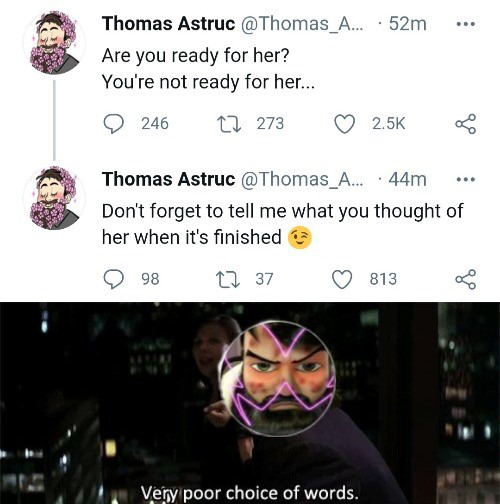
Well... It's finally here... the episode introducing the new bee hero. And what do you know? It looks like I was right about how the new character would be portrayed.
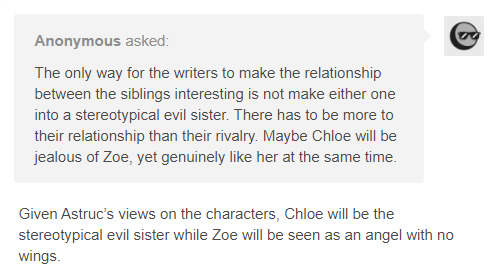
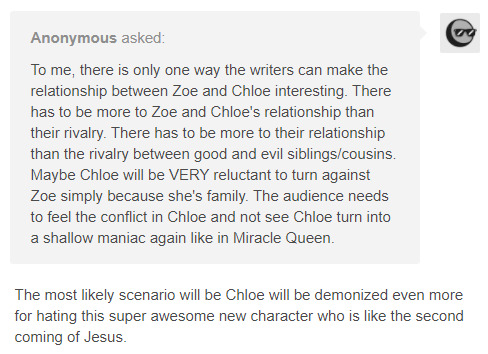
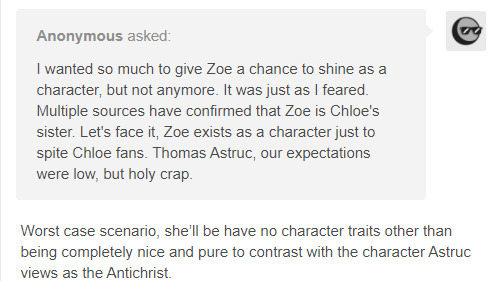
It's kind of funny how I made predictions exaggerating what could happen, and they were surprisingly accurate. Isn't that funny?
youtube
Let's just get into the seventh (chronologically the seventh and the seventh episode in the season to air after “Mr. Pigeon 72”) episode of Miraculous Ladybug's fourth season: Sole Crusher. Damn, I hate that a pun this clever was used for the title.
We get to the point pretty quickly with the first scene being Zoe arriving in Paris and getting a tour of the city. She asks to stop at the Dupain-Cheng bakery, where she meets Marinette through some brief Unfunny Marinette Slapstick. The two quickly strike up a conversation.
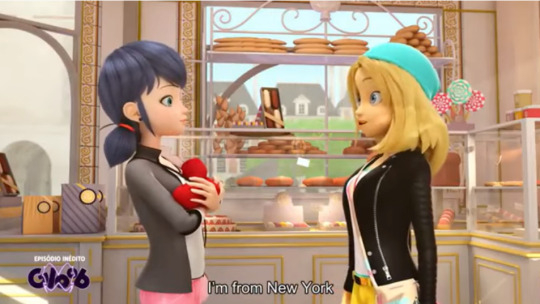
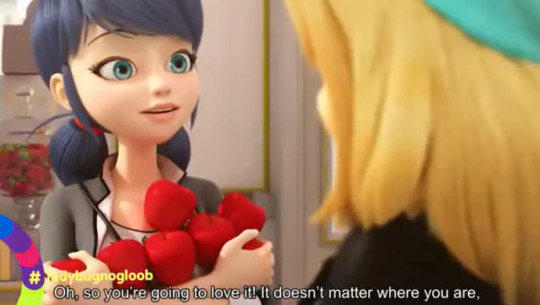
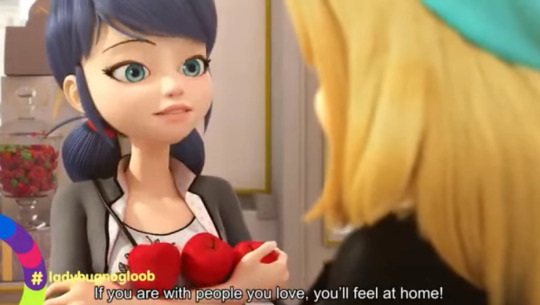
I mean, it's not like Zoe is the sister of the absolute worst human being in existence, right?
Marinette compliments Zoe's shoes, and she points out that she designed them herself, and wrote every good thing anyone has ever said to her on them. But because she only has one friend, there's only a standard “I <3 U” on the left shoe.
So Zoe leaves the bakery and heads to Le Grand Paris where she meets her mother, Audrey. Unlike how she talked with Marinette, Zoe pretends to be just as snobby as Audrey in order to fit in. She then meets up with Chloe, who criticizes her for having poor person things like a phone without any diamonds embedded in it. And then she sees Zoe's shoes.
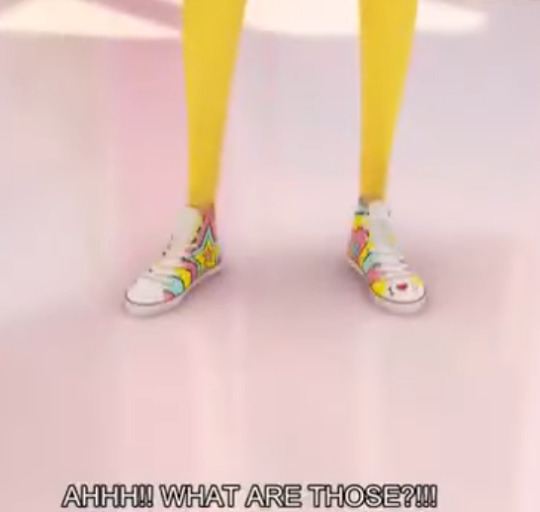
Look, that meme was already dated when it was referenced in Black Panther three years ago. Please don't try to reference memes in 2021, Miraculous Ladybug.
Chloe offers some golden heels while saying that those kind of shoes are for winners to wear and crush the losers underneath. This is the only episode to mention this kind of ideology, and believe me, it gets worse when Chloe decides to teach Zoe how to be like her.
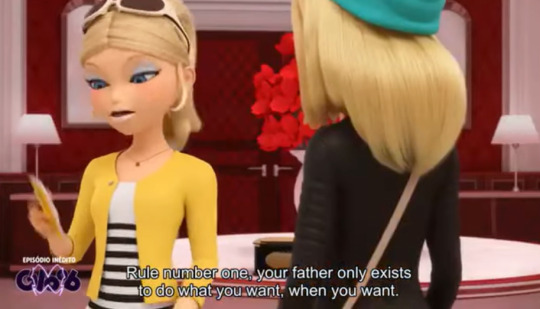
youtube
Get used to this. This episode is all about demolishing any semblance of likability in Chloe's character. Now that Astruc doesn't have to bother with writing Chloe with decency since she's not Queen Bee, watch as he turns her into an absolute caricature of her former self.
Yes, Chloe has ordered her father to give her a lot of frivolous things in the past, but she has been shown to care about him, like immediately rushing to hug him after she was safe in “Origins” and showing concern for when he was akumatized into Malediktator while apologizing for causing it. For the love of God, one of the first things she did when she allied with Hawkmoth at the end of Season 3 was to have him unto her parents' akumatization. I guess she only cared about her rich parents for their status and not because she actually loved them right?
Next up on the list of Chloe's positive qualities to ruin is her friendship with Sabrina.
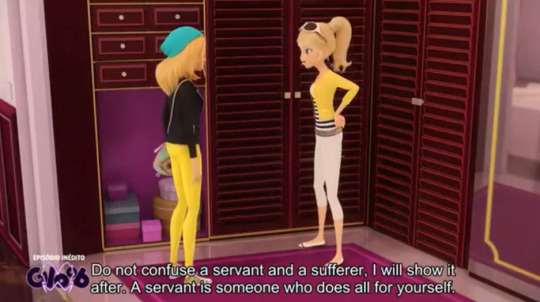
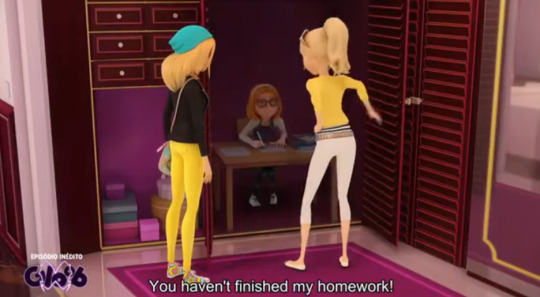
🎶It's seven o'clock in the morning🎶 🎶I can't believe they made this scene🎶 🎶With the writing Astruc's enforcing🎶 🎶It's like he's trying to piss off me🎶
Yep, Chloe doesn't view Sabrina in a twisted view of friendship anymore. Now she's a slave. I'm not exaggerating by the way, he actually said that in a tweet.
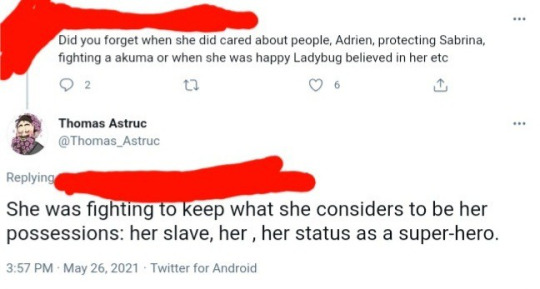
THIS IS WHAT THOMAS ASTRUC ACTUALLY BELIEVES
Okay, so I guess all those times we saw Chloe playing superheroes with Sabrina in “Antibug” and “Miraculer” were just a slave driver playing with their property. Actually apologizing to Sabrina for getting her akumatized in those episodes? Protecting her from the Scarlet Akumas in “Ladybug”? She was just interested in keeping her slave around. I think Astruc may have slept through the slavery unit in his history class. Yes, Sabrina was mostly used as a joke to show how controlling Chloe could be, but there were still semblances of an actual friendship between the two.
Chloe arrives at school and introduces Zoe as her half-sister, despite being the same age and having the same mother. Because I guess we can add basic biology to the list of things the writers don't understand. Now that we're at school, Chloe's friendship with Adrien is next up on the chopping block.
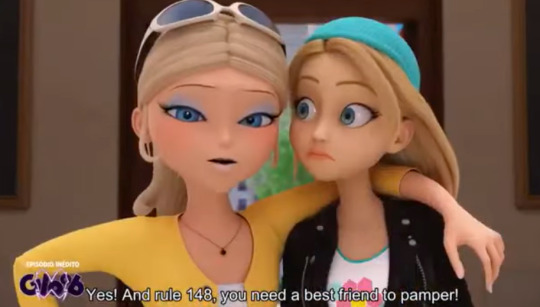
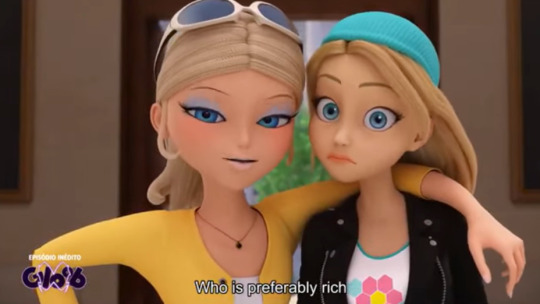
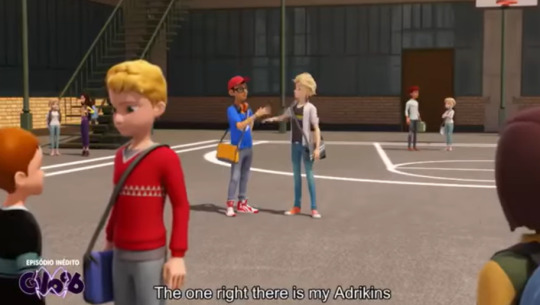
Yep, despite being Adrien's only friend and making a big deal about valuing his friendship to the point where she threw a big party just to make sure he wouldn't leave her and risked cooperating with an Akuma to save him, now Chloe just sees Adrien as a rich meal ticket. Two of the earliest episodes to show Chloe had a more compassionate side to her, and they just undid them. Even as much as I hated the episode, “Felix” showed Chloe was willing to cooperate with Marinette and her friends just to find a way to cheer Adrien up on the anniversary of his mother's not-death.
For the love of God, Astruc, 1984 was supposed to warn people about what could happen if they rewrote the past, not encourage people to rewrite the past. He probably finished Animal Farm thinking Snowball really did work alongside the humans, didn't he?
Marinette comes up and Zoe pretends to hate her, leading Marinette to wonder why she did that. She texts Zoe (she gave her number to her earlier) and invites her to a concert on the Liberty, but Chloe finds out. Zoe thinks fast and pretends it's just so she can torment her more. Chloe then takes out a book listing all the ways she can torture Marinette. I wonder if this is a metaphor for the writing process behind most of the episodes last season.
Zoe decides to go outside for some fresh air, and Andre comforts her. Funny how Andre bends over backwards to give Chloe whatever she wants, yet he's willing to actually talk to Zoe like an actual parent. Andre tries to cheer Zoe up, but she talks about her past where she had to put on an act so she would be liked, but (bet you've never heard this before) she just wants to be accepted for who she truly is. The surge of emotions is enough for Shadowmoth to akumatize her into Sole Crusher.
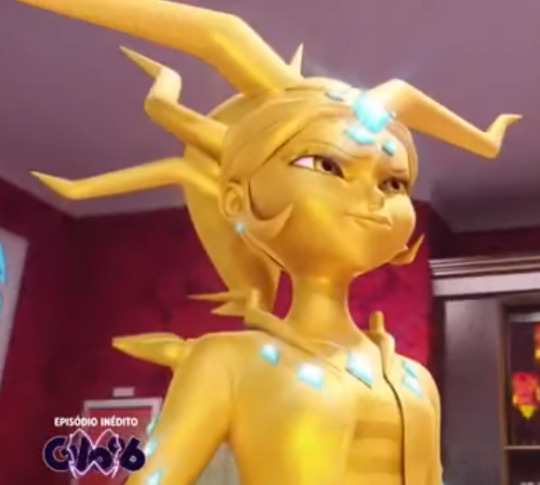
In addition to having one of the most clever puns for an Akuma name, I actually like Sole Crusher's design. Not only is it a good excuse to reuse Chloe's character design, it makes sense thematically, as Chloe was trying to mold Zoe into a copy of herself. The gold and diamonds also make sense given Chloe's love for shiny things. Her powers tie into the bizarre belief Chloe has about stepping on the winners. Whenever Sole Crusher kicks or steps on someone, she absorbs them and gets progressively bigger, making it easier to do so. While it's not cracking my top ten anytime soon, it's still an interesting character design.
Sole Crusher heads to the hotel to get Chloe, and she manages to get away pretty quickly. Maybe in an alternate universe, she's a track star? For some reason, she runs to the Dupain-Cheng bakery and then... Oh my God... pushes Marinette's parents so they get absorbed by Sole Crusher, before trying to do the same with Marinette.
youtube
When has Chloe ever done something like that? Whenever she endangered someone during an Akuma attack, it was unintentional or a result of her naivety. She was only trapped in Pixelator's dimension because Adrien tried diving to save her, she only alerted Rogercop to Ladybug's presence because she eagerly called out for her, and during “Zombizou” she only tried to throw Sabrina towards the horde of kissing zombies once, and that was meant to highlight her growth. The only person to actually do stuff like this consistently is Lila, but I guess she got vaporized by Big Brother offscreen.
This episode is determined to make the audience hate Chloe by retconning everything about her character while portraying her as a complete monster. As bad as Chloe could get, she was never selfish enough to use anyone as a human shield. This kind of behavior honestly could be explained by saying Chloe was lashing out as a result of losing the Bee Miraculous permanently, but the events of the Season 3 finale aren't mentioned ONCE, not even in the next episode that introduces Queen Bee's replacement! How the hell can you set up the next Bee hero without explaining why the original needs to be replaced in the first place?! And trust me, I'm going to talk about Zoe replacing Chloe later.
Sole Crusher grabs Marinette in her hand, so the Horse Kwami, Kaalki, uses her power to teleport over to Adrien's house and inform him Ladybug needs help, meaning once again Adrien did nothing in this episode before becoming Cat Noir.
At the Liberty, Chloe offers more victims to Sole Crusher in the form of the band Kitty Section (consisting of Luka, Juleka, Rose, Ivan, and Mylene) and theatens the giant golden supervillain she can send her back to Paris, even though she's really not in a position to bargain right now. And she STILL continues to insult her. Do you hate Chloe yet? Come on, do you? The writers won't stop until you do.
After we see Sole Crusher's conflicted emotions, Marinette is set free by Cat Noir and transforms into Ladybug, immediately summoning her Lucky Charm, a shoehorn. They only learn Zoe's sneakers were where she were akumatized thanks to Chloe's ranting, so the episode unintentionally made Chloe save the day. Ladybug breaks into Le Grand Paris and breaks the sneakers where Zoe hid them, using the shoehorn to open a door. So Sole Crusher is de-evilized, Ladybug fixes the damage, and gives yet another charm to Zoe.
Afterwards, Zoe goes to the Liberty, apologizes for the act she put on, all while divulging to the audience her “tragic backstory”.
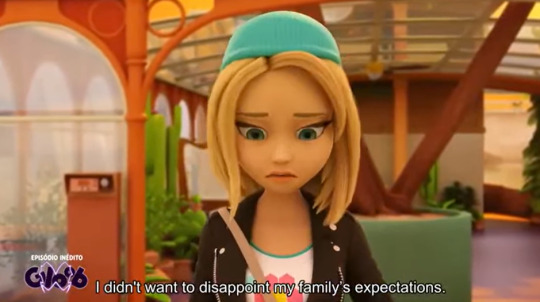
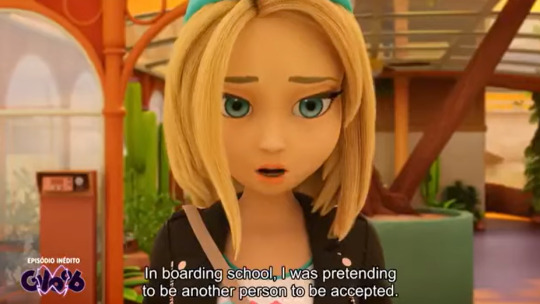
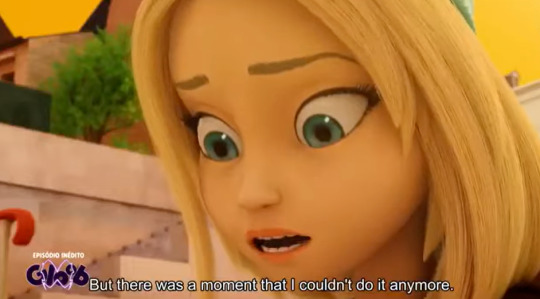
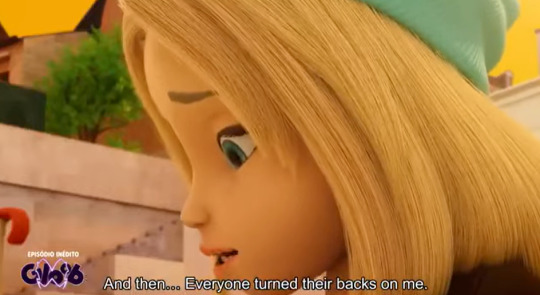
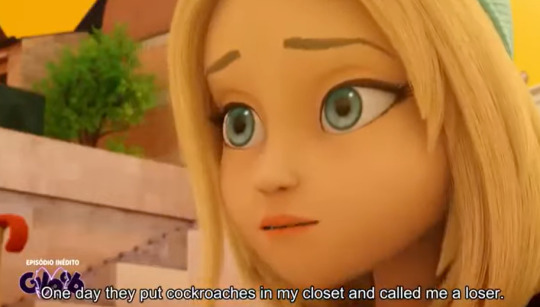
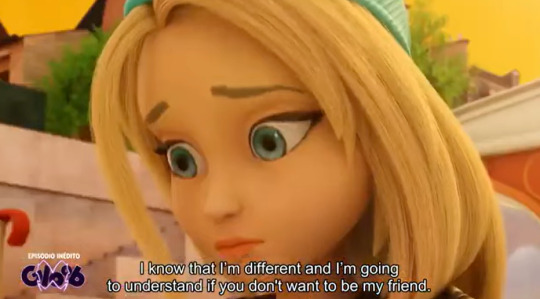
Of course, everyone welcomes her with open arms.
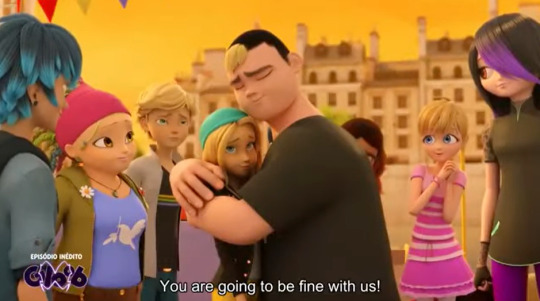
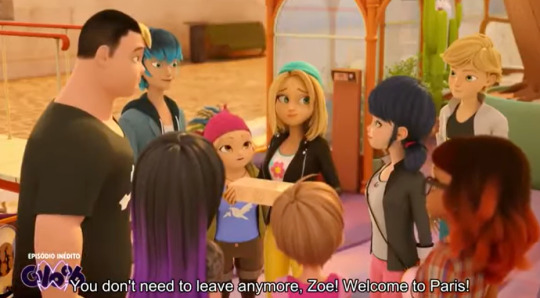
And right here is where the biggest problem I have with Zoe as a character. I normally hesitate to use this term given how often it gets thrown around when criticizing characters these days, but I really can't say anything else.
Zoe... is a Mary Sue.
For those who don't know, the term Mary Sue originated in a Star Trek fanfiction from 1973 satirizing several self-insert stories at the time. Most of these stories showed a beautiful young woman joining the crew of the Enterprise and immediately gaining the attention of the crew. Mary Sue parodied this character archetype by showing how much she was appreciated by Captain Kirk and Mr. Spock, the latter being driven to tears at her funeral despite his species being emotionless normally.
What does this have to do with Zoe? She has the exact same storyline as Mary Sue in the parody fanfiction. Her mere presence is enough to make Chloe act extremely out of character in an attempt to make her look better, and as soon as she apologizes while giving a frankly vague backstory, everyone just accepts her as their friend, and I mean everyone in the entire class. I'm sorry, but it just doesn't feel earned. Why was she bullied at her old school? What did her bullies have against her? What caused her to stop going along with her peers, and why did everyone turn against her? How the hell did the bullies who put cockroaches in another student's locker get no punishment while the victim was forced to transfer schools? It's an intentionally unclear backstory designed to make the audience feel sympathetic towards Zoe without actually doing anything else.
I want to ask anyone reading this who watched the episode a question: Outside of her backstory, what do we actually know about Zoe?
What is her personality like? She's nice? Socially awkward? We've never had a character like that in Miraculous Ladybug before! Sorry Marinette, Adrien, Juleka, Nathaniel, Mylene, and Marc, there's a new character with more personality than all of you combined!
What are her goals? She wants to be an actress? Great, but why? Even though there's no clear answer for why Marinette loves fashion, or why Alya loves journalism, or why Nino loves DJing, you can still see the passion in their lives when they do something related to their goals. Zoe only says she wants to be an actress, connecting it to her people pleaser backstory (and given how it ended, she must be a terrible actress), and in the next episode, she immediately gets the lead role in a student film.
When Mylene got the starring role in the movie in “Horrificator”, we at least got snippets of her acting skills in the same episode that established her desire to be an actress, which is also implied to be because she was inspired by her father in “The Mime”. She didn't just say she wanted to be an actress and got the leading role. She still had problems to overcome like her cowardice, which threw her own self-confidence into doubt. Here, Zoe just says she wants to be an actress, and is rewarded for no reason the very next episode.
Zoe basically exists only to be a foil to Chloe, and the writers had no idea what to do in terms of a personality, so they just dumped a bunch of extremely likable character traits onto her without thinking of how her character could come off. And like I said, she's a Mary Sue.
I'm not the only one who thinks this. I've seen a handful of posts on this very site calling Zoe a Mary Sue. In fact, I even asked another Tumblr user @anxresi to quote their take on Zoe being a Mary Sue, which I couldn't even top in terms of accuracy. They basically listed off five things that made Zoe a Mary Sue.
She has to have a ‘tragic backstory’ so all the other characters will fall in love with her. Usually within minutes, in the very first episode they’re introduced.
She has to have a supercute design so that the audience at home will fall in love with her. And if they don’t, they’re automatically dismissed as ‘haterz’ even if their objections are purely from a writing POV.
Her only flaw will be thinking too little of herself. “What, lil ol’ me as the Bee Miraculous holder? With my shyness, colorful shoes, chic beret and personalized pink strip in my hair? Gosh, who’d have thought it?”
The contrast to her half-sister will be a constant plot point, with Chloe always getting dumped on. “You see, kids? Bad things happen to bad people. But you see this super-sweet girl over here? She gets a free DAD. Instant FRIENDS. To star in her own MOVIE. The chance to be a SUPERHERO, even though she only arrived last week. Who cares if she has no depth, no personality and barely any reason for being in the show, apart from being a massive ‘Up Yours’ to all the Chloe fans out there?”
What about character development, Mr Generic Zag Guy? “Development? What’s that?! Zoe is already perfect as she is. The only ‘development’ she’ll receive is having her hair done in the first episode she’s introduced. Besides, That‘d’ word is banned here at Zag studios. Why do you think we abandoned Chloe’s stillborn arc so quickly? This is a KIDS show, why bother trying to create a complex character with more than one dimension?”
This is essentially who Zoe is. She's perfect, has no character flaws, has a cute design so the audience will love her already, and was designed only to replace Chloe as Queen Bee. That's all she is.
So the episode ends with Zoe feeling happy at all the new friends she made while we get one of the most blatant attempts of symbolism in the ending card I've ever seen.
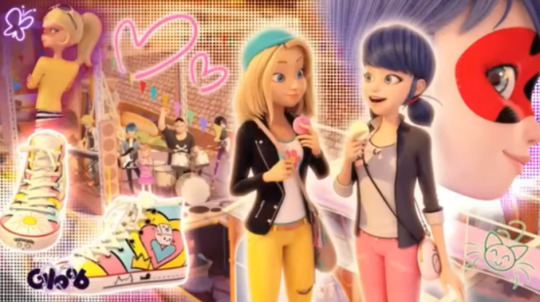
See, look. While Marinette is happily talking with Zoe with the image of Ladybug next to them, Chloe is to the far left with an EVIL purple aura, showing how bad she is compared to how great Zoe is. Only a braindead moron would actually like Chloe over the super awesome and pretty Zoe!
I'll give my final thoughts on the episode in the next part where I analyze this plotline as a whole.
LINK TO “QUEEN BANANA” REVIEW
#immaturity of thomas astruc#iota#thomas astruc#thomas astruc salt#miraculous ladybug#miraculous ladybug salt#marinette dupain cheng#ladybug#adrien agreste#cat noir#chat noir#chloe bourgeois#queen bee#queen b#zoe lee#vesperia#sabrina raincomprix#andre bourgeois
289 notes
·
View notes
Note
You know, bringing Penny back already had the risk of cheapening her death, but NO ONE having an emotional reaction whatsoever and Pietro being like “Yeah, I guess she did die lol :D” just DESTROYED the weight of her death. Just another reason I felt nothing when she died again.
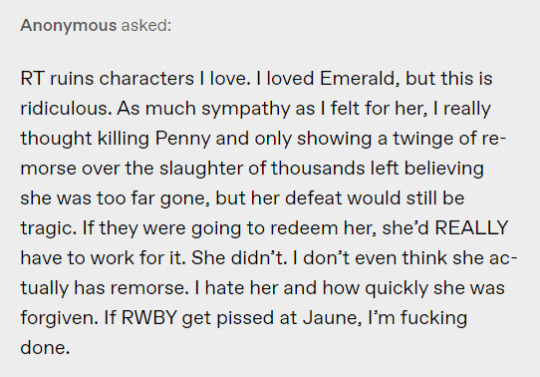
The lack of reaction to Penny's resurrection will, forever and always, be a black mark on the series for me. I'm not at all surprised that she was brought back given her android status and popularity among the fandom, I can't even fault RT for restoring our original Penny perfectly given the latter (as opposed to getting a "Penny" without her personality and/or memories), but the sheer indifference to her cheating death? Not just that, but treating her return like a joke? Oh haha, silly Penny with her overenthusiastic hugs. I sure missed that bubbly girl back when our enemies manipulated our now murdered friend into killing her and that trauma kick-started the destruction of our school :)
And this trend in the fandom of going, "Just wait"? Penny suffered from it too. Massively. Like we were told to just wait to return to Oscar's mystery shopping trip, or for the reconciliation with Ozpin to start, or, now, for Emerald to undergo an actual redemption arc, the lack of reaction to Penny's return was explained away as shock (and haven't we heard that one before). Ruby will need to grapple with these emotions, it's just that she was so stunned by this turn of events! But, quite obviously, that never happened. Ruby and Penny's relationship fundamentally returned to where it had started, with Penny making comments about how she isn't allowed certain freedoms and Ruby reminding her that she's a real girl despite it all. A death and the trauma of losing a friend? Not a part of their Volume 7-8 dynamic, to the extent that the story throws them a party in the arena where Penny died — and where Yang was framed, and where the Battle of Beacon began — and not a single character has anything to say about that. The meaning that Penny's death carried in Volumes 3-5 was, in short, erased... and then Penny's entire journey of learning that she's always been real is erased too in an effort to kill her off for good. Her human body wasn't included because it was something she strove for (it wasn't), or something the group needed (it wasn't), or because it was a thematic culmination of her journey (quite the opposite), or even because it follows her inspiration (Ironwood's Tin Man would have something to say about that). It exists solely so that Penny could be murdered again, this time for good. The mad scramble to theorize that she's not really dead (again) is telling. Even the most complimentary fans, those who were quite happy with Penny becoming a human and took no issue with her story throughout 7 and 8, recognized that her death was a horrific, meaningless scene that served only to drum up shock value and give Jaune something to angst over.
I'd even go so far as to say her time as the Maiden was meaningless too. Not just in terms of her not actually doing anything with the powers and Winter ending up with them as originally planned — those two points have both been covered extensively — but in regards to the fact that the group didn't react to that either. Our formerly dead friend came back and a short time later is one of the Maidens? Neat! And that's the extent of their emotional investment in Penny's change. Neat, we've got a stronger fighter now. I just answered that ask that referenced Yang and Ren's fight and that's literally Yang's entire thought on the matter: "We have the Maiden." The Maiden is positioned as a useful tool in this war; a checkmark in the "Victories" column when your friend thinks you haven't achieved enough. But doesn't anyone care that the Maiden is Penny? It's particularly strange to me given the six years of fandom discussion surrounding Pyrrha's almost-time as a Maiden too. As someone (quite obviously lol) interested in Ozpin's character, his desire to make Pyrrha the next Fall Maiden is often viewed as one of his worst acts, supposedly taking this poor, defenseless student and manipulating her into accepting a power that will ruin her life. So much of this is conjecture and even more is an erasure of Pyrrha's agency, and the hypocrisy here is on full display when we look to the reaction to Penny's acceptance of the powers instead. No one is worried about how this power is supposedly going to ruin her life. Or drive all her friends away. Or make her a target to be murdered (again) which is precisely what happens. Or turn her into a tool for the evil men around her to abuse — even though Penny is the one who actually has storylines revolving around her agency, from Pietro building her to be Atlas' obedient weapon to Ironwood ordering her back to his side. Yet the characters don't react to this change with any of the horror we might have expected, because these views don't derive solely from fan headcanoning — we've got moments in the text too. Like Jaune convincing himself that Qrow and the others forced Pyrrha into this. Or the knee-jerk reaction to "real" magic and the horrible things it must do to you. Yet Penny walks out of that lab brimming with a foreign magic, something that Ironwood had always planned to pass onto one of this allies, a power that they know has gotten numerous people killed, and our group is just like, "Cool. Penny upgrade." Everything about Penny's Volume 7-8 journey demonstrates a lack of forethought; the authors' inability to connect what they're currently writing to what came before and what will come later. The lack of reaction to her death, the framing plotline going nowhere, a total acceptance of her as the Maiden despite complicated feelings in the past (and we can toss Yang's assumed secret about Raven in here too), the ableist and contradictory message of giving her a human body, dying again just an episode later, doing so in a way that throws Jaune back into the same situation we've seen before... none of it is emotionally fulfilling when set against the rest of RWBY.
And Emerald, as you say, is a crucial part of all that. Emerald is the one who originally orchestrated Penny's murder. We see her love for Cinder pushing her to attack Penny again just hours before she joins the group. Emerald pretends to be Penny in order to get close to Ironwood... and the only thing we get from all this is a quip about how "weird" it feels to do good. Their stories are woven together and the fact that RT doesn't seem to realize that does a huge disservice to them both. The question of, "How does Penny grow after being resurrected post-murder?" and the question of, "What will it take to redeem Emerald?" are irrevocably linked to one another... and yet neither character was given the chance to answer those questions in a fulfilling manner.
62 notes
·
View notes
Note
Tubbo for the character breakdown? :D
How I feel about this character
c!TUBBO MY BELOVED.
The Sidekick. The Yes-man. The Pawn. The Child Soldier. The President. The Government. The Revolutionary. The Fool. The Scientist. The Husband. The Best-friend. The Leader. The Follower. The Underestimated.
Tubbo is a man with many titles, and as the situation calls for it, he can wear any of them comfortably.
Tubbo is defined, more than a lot of characters, by those titles, and by who calls him by which ones. The roles that he has played over his tenure on the server have left a more dramatic impact on both how he is perceived by others, and his own self-image.
He’s Tommy’s Sidekick and Best-friend - but he’s also Ranboo’s Husband, and Snowchester’s Leader, and A Scientist with Jack Manifold, and an (ex) President to Techno, and a Pawn to Dream.
What's interesting is that this relationship with titles is one he shares with Technoblade, and it's a unique way in which they foil each other. None of either of their other foils really share this dynamic, and to add to it, they both propagate this in each other. The difference is in how they deal with, feel about, and utilize it.
Techno is “The Blade” and “The Blood God,” and he hates it. He feels used, objectified, and reduced to a weapon by these titles. At the same time however, the actions he ends up taking only reinforces the way the average people perceive him – violence, blood and anarchy. The reputation Techno has aqquired often overshadows the person who might prefer to be seen as.
Tubbo on the other hand, tends to slip into the these titles without much resistance. He accepts them, sometimes for better and sometimes for worse. He's happy to be Tommy's sidekick; He takes on the role of President of L'manberg; He accepts Dream's metaphor for himself as a Pawn. But to his advantage, his flexibility within these roles and the ability to put them on and take them off as he pleases gives him a uniquely wide arsenal of social tools.
There is so much more to say about c!Tubbo but If I keep going I could be here for hours...
All the people I ship romantically with this character
I am an enjoyer of his marriage with Ranboo, although I wouldn't call myself a shipper really.
I think their dynamic as two people who value kindness, but who also possess the capacity to be surprisingly ruthless, makes them an unusually dangerous and honestly, somewhat thematically opposed pair.
Tubbo is one of the people on the server who has the longest and most consistent relationship with what Ranboo would consider “sides” which automatically sets him up as a foil. Before even L'manberg, it was Tommy and Tubbo vs. Dream, and Tubbo has always held that loyalty close to his heart, and likely wont be cutting that off anytime soon. As a consequence of this, he naturally adds Ranboo to the list of people “on his side,” quietly, but surely.
Ranboo's somewhat correct, somewhat misidentification of “sides” as the root of all conflict on the server, in contrast to Tubbo, drives him to be more individualistic, “choosing people over sides.” And accordingly, it would be a stretch to call him a member of Snowchester, despite how deeply entrenched he's become in it's founder's life. At the same time, it's clear that Tubbo is one of, if not the most important person to Ranboo out of everyone on the server, and he's willing to do anything to protect him.
All in all, Ranboo and Tubbo end up being an odd couple for a multitude of reasons, who, despite some very core differences in personal philosophy, both end up caring for each other ferociously.
My non-romantic OTP for this character
I would love to be contrarian here, but I just can't. Clingy Duo 4 LYFE!
Tommy and Tubbo's friendship, from the start of their time on the server to the current day, has been one “thing” that I continually return to, and that the story over all returns to. They are the emotional anchor of the server in a lot of ways – both a representation of it's innocent, idyllic past, and it's forward march into a darker future. Whenever the narrative wants to make a story beat feel strong and impactful, they'll often end it by echoing the scene on the bench that started everything, whether or not it's Tubbo and Tommy specifically; their Bond resonates so strongly throughout the DNA of the story that their Bench has become a Symbolic Archetype all in itself, and is something that no longer even requires the two of them present to recall it's power as a representation of Attachments, Loyalty and Platonic Love.
TLDR; Clingy Duo is the glue that keeps the core of the story together, and intentionally or not, most important friendships will end up either paralleling or foiling them by the sheer fact of how impactful their relationship is to the greater narrative.
My unpopular opinion about this character
I don't know how unpopular or not this opinion might be, but I do consider Tubbo to be a darker character than a lot of the content for him I see produced.
One way this expressed: he's incredibly pessimistic. He's a person who lives his life hyper aware of how easy it is to die, and with a full acceptance that, if a worst case scenario should arrive on his doorstep, he would die without hesitation, if he had to.
That isn't to say he isn't invested in preventing that, far from it – but there is an undercurrent of absolute certainty that he is living on borrowed time.
One interesting development on this is how he's expressed this – during the Disc Finale, Tubbo has already accepted his own death. He tells Tommy that he's “done enough” and that he should let him die so that Tommy can have his disc back. He tries to get Tommy to resign, to not fight Dream in the end because he can tell that they've already lost and he doesn't want him to have to die too or suffer more.
Contrast this to Snowchester now – as we've learned that the Nukes have dead-mans switch; a suicide button, that only Tubbo knew about. It's a far more proactive expression of this mentality, a final ace up his sleeve, so to speak, so that if an unwinnable situation should occur again, he can turn it from a loss into sick kind of pyrrhic victory.
It's important to note that Tubbo has not yet projected or pressed this mentality onto others; this is self destruction only, and I do think that says something about him, although it's less positive and more tragic.
One thing I wish would happen / had happened with this character in canon.
VILLAIN ARC. VILLAIN ARC. VILLAIN ARC.
Okay, as a specific example, there is sooooo much missed potential for Egg!Tubbo (and Egg!Tommy) and I will die on this hill.
Imagine, in a world where Tommy isn't immune: Tubbo gets trapped and infected by the egg, as it offers to grant him the one thing he wants most in the world.
The vines grow around Snowchester, seeping into the cracks in it's walls and then hardening into a scaly form, creating a shell around his home. The ambient radiation causes the egg to grow faster in this area, and form odd spikes that loom outwards from the heart of the town, like blades pointed at anything that gets too close.
Tommy realizes too late what's happened, and when he tries again and again to convince Tubbo to just come with him, please come with him to Church Prime, he’s sure that they can find a way--
--he ends up letting Tubbo lead him, and follows him down to the depths of the egg.
When the doors behind them are covered in thick vines, and the humidity of the room increases, and every breath feels like it draws in clouds of dust, it’s already too late to run.
Tubbo stays with Tommy for the two weeks it takes for his will to break and the egg to infiltrate his mind; it's offers of wealth and vengeance and rebuilding L'manberg and resurrecting Wilbur and making people love him and making him powerful and giving him the whole world--
--all rejected, until finally, in the sickening red haze of Tommy's mind, a single scene; a clear blue red sky, the sun high and bright, a warm breeze blowing in, a bench, the sound of good music, and there--
Tubbo moves and the vines around him creak, having been undisturbed for days. He places his hand on the mass of crimson where Tommy is trapped waiting.
--Tommy grins and rushes forwards, all of the weight in his heart, all of the dread and responsibility and fear and anger and hurt and pain, all of it suddenly gone on the breeze as he takes his place next to Tubbo on the bench.
The Eggpire grows. The vines begin to appear in more vulnerable places – peoples secret rooms, near their pets, wherever they keep their most sentimental objects.
Tommy loves causing harmless mischief, and the feeling of being accepted, of being cared for? It's perfect. Nothing can touch him now, where everything is simple and easy and just the way it should be.
Tubbo knows. It's not a deep feeling, it's not a secret part of himself still in there, still fighting. He knows, and when he sees Bad staring him down, piercing through him, he knows that Bad knows too.
There is no kinship for them. There can't be. That would be too close to rebellion against The Crimson. That would be too close to comfort.
But Tubbo knows quietly. He's not a follower by nature, but he'll follow now, simply because he's seen the most logical way to attain what he wants.
And he and Tommy will make a kinder, safer world then the one the Crimson is eating now.
#i lowkey wrote fic at the end there??#who knew i had it in me lmaoo#dream smp#tubbo#thank you for the ask Khizuo :D
47 notes
·
View notes
Note
HI! I'm new to the MDZS fandom and I fell in love with Suibian, but you don't see it that much. I seen somewhere that it would burn out a weaker core and I cried cause I wanted to see that, and as far as I know it doesn't happen anywhere. I'm wondering if you could tell me anything and everything you know about Suibian. I'm starving for anything about it
hi anon! ahahah, it’s always a dangerous thing to ask me about “anything and everything” on a topic because I usually have too many thoughts, most of which are unorganized. but! if you’re interested in that, then here we go!
First, re: your comment about Suibian burning out a weaker core: I am not aware of this theory (or is it something from an interview?? if someone knows, please say so!), but if it brings you joy, then it’s certainly an interesting one to consider! Unfortunately, I don’t have much more to say on it because I’m unfamiliar with it, but I do have quite a lot to say on some other Suibian concepts!
ask and ye shall receive (a very jumbled heap of thoughts as i spiral further and further out of control):
[all rough translations are mine, and thus all mistakes are mine. I am using the version of the novel that is available on luoxia because I can’t be bothered to go flipping through my print edition ahaha.]
the questions about Suibian that interest me the most are why it sealed, when it sealed, when Wei Wuxian began to wield it again, and what that might all mean. I’m going to be talking about novel, CQL, and audio drama canon all together, because I think looking at each canon alone and in combination can raise a lot of very different points!! (I have not watched the donghua or read the manhua yet, so forgive me, I have nothing to say about them. /o\)
So! the one piece of information that we’re given consistently throughout all three of the canons is that Suibian was sealed after Wei Wuxian’s death and that no one but Wei Wuxian himself (and Jiang Cheng, by proxy) could draw it from its sheathe. Thus, Wei Wuxian’s identity is revealed and the golden core swap comes to light. Wei Wuxian is surprised by this, and asks Lan Wangji, “Did it really seal itself?” (novel, chapter 63; CQL, ep 42; audio drama, S2E15).
The novel and audio drama both include a line from Wei Wuxian that emphasizes Wei Wuxian’s surprise, implying that sword-sealing is very uncommon:
万中无一的大好事竟然让我给撞上了
Something incredible that happens less than once per ten thousand times, and I actually encountered it.
the irony, of course, is that this incredible thing is what ended up blowing his cover. rip Wei Wuxian.
but what I think gets really interesting is comparing different points at which Suibian sealed itself and what that might imply in conjunction with other information. Jin Guangyao says “shortly after” his death, but CQL includes a scene in episode 19 that implies that Suibian actually sealed itself much earlier.
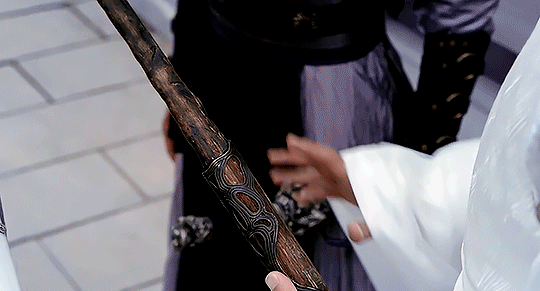
[ID: Gif from episode 19 of the untamed drama. Lan Wangji attempts to draw Suibian after he and Jiang Cheng storm the Nightless City and retrieve their swords. He cannot pull it from the sheathe. /end ID]
(in case anyone is curious, it’s about 30 minutes in. I spent the effort to make the gif, so I might as well give you the timestamp lol)
this scene takes place during the period of time when Wei Wuxian is in the Mass Graves (aka the Burial Mounds) after Wen Chao cast him down and left him for dead, right near the beginning of Sunshot. I’m fairly certain it’s not mentioned in either the novel or the audio drama, so this is a CQL-only detail. (please correct me if I’m wrong; I get my canons muddled all the time //hides face)
CQL basically does nothing narratively with this scene other than giving us some sad shots of Lan Wangji and Jiang Cheng (honestly, valid ;A;) but!! if we decide to accept this scene as our jumping off point, we can get to some interpretations about Wei Wuxian using information from the other canons!
take this exchange from chapter 57 of the novel (immediately prior to the massacre at lotus cove):
江澄道:“还不是又为咱们的剑的事去温家了。一想到我的三毒现在说不定被哪只温狗握在手里,真是……”
他面露嫌恶之色,魏无羡道:“可惜咱们的剑还不够灵,要是能自动封剑,那就谁也别想用了。”
江澄道:“你再修炼个八十年,说不定可以。”
Jiang Cheng said, “He’s gone to the Wen sect regarding our swords again, hasn’t he. Whenever I think that my Sandu might even now be in some Wen-dog’s hands, ugh…”
His face filled with loathing, Wei Wuxian said, “What a pity our swords don’t have enough spirit. If they could seal themselves, then no one could even think about using them.”
Jiang Cheng said, “If you kept cultivating for another eighty years, maybe.”
from the novel, it seems clear that sword-sealing is something that only happens when a person’s cultivation level is exceptionally high. if this is true, and we go with the CQL timeline of Suibian sealing itself long before Wei Wuxian’s death, it means that Wei Wuxian’s cultivation level wasn’t just high, it was leagues above pretty much anyone else when he was still a teenager. (In fact, Suibian had most likely already sealed by the time this conversation takes place.)
If we don’t go with CQL’s timeline, however, I think we could make a very different argument. It’s a bit of a reach, but I think it’s a lot of fun, if you’re willing to come with me on this journey!
Jin Guangyao says Suibian sealed itself “shortly after” Wei Wuxian’s death, but we don’t really have external confirmation of that. For all we know, someone only bothered to test it sometime after his death, and Suibian had been sealed for some indefinite amount of time. All we can say for sure is that by some point shortly after Wei Wuxian’s death, Suibian was already sealed and resisted being drawn by anyone who tried it.
We’re told over and over that one can only wield a spiritual sword effectively if you have a golden core/the spiritual energy to match it. Wei Wuxian stops carrying/using Suibian because he knows that in his hands, it will act as nothing more than an ordinary sword. His method of cultivation is no longer suitable for the sword. Suibian is tied to both Wei Wuxian’s soul and his golden core.
If sword-sealing only happens when the cultivator’s level is unbelievably high, then I think we can make the argument here that by the time of his death, Wei Wuxian’s core was likewise unbelievably strong – but Wei Wuxian is no longer the one developing his core. Jiang Cheng is.
I know it’s a ridiculous reach. To be clear, I don’t think the text actually intends this or supports this in any meaningful way, but I do think that it gives us some very tasty potential!! If Suibian sealed itself sometime after the core transfer (which, honestly, we wouldn’t know – after all, who’s been trying to draw Wei Wuxian’s sword?), but just if, I think we can plausibly make the argument that Jiang Cheng’s cultivation is truly extraordinary.
:DDDDDDDD
It’s fun right?? It’s a fun concept!!! Even if it’s nonsense, even if it’s not that deep, even if this was an unintentional coincidence, I think it would be interesting to look at this as being some kind of measure of Jiang Cheng’s accomplishments. On the flip side, I also think it’s very important thematically that Jiang Cheng’s value as a person has nothing to do with his cultivation, that he is, in fact, always second-best, but that doesn’t make him any less worthwhile or deserving of love. Maybe I’m just projecting lmao. Of course, being extraordinary doesn’t preclude him from still lagging behind Wei Wuxian–Wei Wuxian might have just been more extraordinary ahahah. We can have both!!
Now for a totally different thing! Interestingly, this conversation about cultivation levels and sword-sealing (the one with Jiang Cheng) also happens in the audio drama, S2E12 (about 15 minutes in, since I just checked), but Wei Wuxian adds an additional comment:
(don’t have the transcription of the original chinese, I’m just going to translate it as I hear it)
“But maybe you don’t need to cultivate to a certain level to have your sword seal itself. What if there were some other way?”
these two versions of the conversation actually imply pretty different things, I think! this addition opens the possibility to the audience that sword-sealing is possible even without an extraordinary level of cultivation, and I think lends credence to the idea that Suibian is just an unusually loyal sword, regardless of Wei Wuxian’s cultivation level. Whether that’s something inherent to Suibian’s “personality”, or whether this says something about how Wei Wuxian inspires loyalty wherever he goes, or whether it just speaks to the strength of their bond remains to be seen.
(obviously, this could imply any number of other things as well, but I find this to be the interpretation that makes me happiest.)
If we go with “Suibian seals itself after Wei Wuxian’s death” in this canon, I think this emphasizes the loyalty aspect with a touch of grief.
If we combine this with CQL and have “Suibian has been loyal since he was a teenager”, that also emphasizes the loyalty aspect – just in a different way.
Of course, doing meta combining unique details from different canons is largely pointless in terms of crafting any real “analysis”, so I’m mostly saying all of this because I enjoy the process of building the supercanon in my head that brings me the most joy! To summarize the varied interpretations I’ve brought up in this post:
CQL-only: Suibian sealed itself when Wei Wuxian was a teenager, at latest, by the time he was thrown into the Mass Graves.
Novel-only: Sword-sealing is very rare and achievable only through extraordinarily high cultivation. Shortly after Wei Wuxian’s death, Suibian is discovered to have sealed itself, so Wei Wuxian’s core, by the time of his death, was extraordinarily powerful.
Audio drama-only: Sword-sealing is considered very rare and achievable only through extraordinarily high cultivation, but might also be accomplished by other methods. Shortly after Wei Wuxian’s death, Suibian is discovered to have sealed itself. If Wei Wuxian’s core is not wildly and improbably powerful, this implies that Suibian has become an exceptionally loyal sword by the time of his death.
CQL/novel: Wei Wuxian was already incredibly powerful by the time he was a teenager.
CQL/audio drama: Suibian has been exceptionally loyal to Wei Wuxian since at least his teenage years.
Novel and audio drama-only have a much wider range of when Suibian could have sealed itself, as mentioned, so there are further variances within those interpretations.
there’s a lot of potential here!! with my personal feelings regarding the story, I like novel-only with Suibian sealing post-core transfer, audio drama-only with Suibian sealing post-Wei Wuxian’s death, or CQL/audio drama with Suibian sealing as a teenager pretty much all equally. I think the CQL/novel interpretation gets too close to casting Wei Wuxian as a hyper-special and innately noble individual in a way that undercuts the strength of his character arc, but that’s my opinion. (As an aside, this is actually one of my major complaints about CQL in general, independent from what I’m talking about here. But that is a topic for another day ahahaha. To be clear, I still love CQL very much, despite my many frustrations!)
As for what I think is the most “likely” to be the “right” interpretation (whatever that’s worth), I would probably say the one that emphasizes Suibian’s loyalty with Suibian sealing post-death, because I think it’s the most thematically cohesive and has the textual support to back it. (I think it’s a valid interpretation even using novel-only text; it’s just slightly less explicit without the additional comment from Wei Wuxian.)
A final detail:
We don’t get anything from either CQL or the novel that explicitly addresses when/if Wei Wuxian is able to wield Suibian again, but the audio drama’s rendition of the “Yunmeng” extra very subtly indicates that by the time that extra takes place, Wei Wuxian has cultivated a golden core and is carrying his sword once more. You only get it at a couple of moments, but Suibian sometimes clinks when Wei Wuxian moves or when he bumps into something. The two instances I can remember specifically are when Lan Wangji tosses the ring onto him (the ring hits Suibian), and when he’s rowing the little boat onto the lotus pond and the motion makes a sound. It’s!!! Extremely good!!! It makes my heart very full!!!!!
ANYWAYS, if all of my scattered rambling didn’t fill the Suibian-shaped hole in your heart, I would also like to recommend @zeldacw‘s wonderful WangQingSuiChen series of comics, featuring anthropomorphized versions of Wangji guqin, Chenqing, Suibian, and Bichen. I believe the most recent comic is here, and there are links to the rest of the comics in the post. If you just want her general tag for the AU (which is more than just the comics), it’s here!
If you have interest in listening to the audio drama yourself, you can purchase it through the MissEvan app (Mao’er FM). There are buying instructions linked in this post! If you need English subtitles, @suibiansubs is the group that does them. :)
I really can’t recommend the audio drama enough, tbh, it’s really really dear to my heart, and the team clearly worked so hard and cared so deeply for the story they were trying to tell. Consider this my regularly scheduled plug for the audio drama ahaha.
As always, my meta is my meta and if you don’t vibe with it, that’s chill! I change my opinions constantly (I think I changed them like three times in the course of writing this ahahaha), and I know some of my older meta has been making the rounds and every time I see it I think about all the ways my views have shifted since I wrote it rip. For this post moreso than usual, I want to emphasize that pretty much all of the meta included in this is meant to explore intriguing what-if possibilities, not for serious literary analysis purposes. I am aware that a lot of this is reaching/overinterpreting into implications that probably aren’t there. I just think they’re fun to consider!
so this was a mess, but I hope you or someone out there enjoyed it anon!!
(ko-fi, if you’re so moved)
#mdzs#the untamed#the untamed meta#mdzs meta#suibian#mo dao zu shi#mine#mymeta#asks and replies#Anonymous#oh dear GOD i did it again#past me: why this will be easy! I already know what i'll talk about! probably this will take an hour#present me: *stares into the camera like i'm on the office*#this post is a MESS#running my mouth at 100mph with zero coherent structure? more likely than you think#cyan gets too deep in the weeds#:/#meta#lmao idk if that matters#a window into my 24/7 stream of consciousness#filtered by tag: suibian#cries in a corner#im so tired whatever im punting this into the void#the structure in this is nonexistent and the language is weak please forgive me
946 notes
·
View notes
Text
The Character-Based Reasons Why Sara Chidouin Has the Highest Win Likelihood
So, okay. We all know Nankidai is, first and foremost, a writer. Don’t get me wrong, the art and gameplay are nice, and the music is... there, but Your Turn to Die is fantastic because of the game’s thematic consistency and incredible characters. Which is why the idea that Sara wins so often because she is so trustworthy and is a great leader always seemed like a very barebones analysis to me. Sure, it makes sense, but what would Nankidai convey through that? There’s definitely a message about trust that is implied, that trusting makes a person stronger, but Sara does not initially trust everyone, and not everyone trusts her. Every single character has plenty of people who don’t trust them and who they don’t trust. If anyone is good at working with and trusting people, it’s Reko (even despite her conflict with Alice), who becomes the big sister to this cast of characters. (BTW: this is a really long post. If you don’t want to read it all, scroll to the end and there’s a TL;DR).
So then, for what thematic reason is Sara so likely to win?
Personally, I would attribute her survival rate to another common theme throughout the game: her balance between prioritizing her own survival and that of the rest of the players. While Sara would never truly give her Sacrifice card to someone else, it’s doubtful that she would take the Sacrifice card to save anyone either. No other character has a similar inner balance, except Kanna in the Kanna Lives route (to be perfectly honest, I have not played the Shin lives route because I’m terrified of killing Kanna, so my knowledge may be lacking). Anyway, I am going to go down the list of characters and talk about why they’re not Sara, which I know everyone is just really, really, excited to hear (please don’t fall asleep). (Also not including dolls since our information on them is very limited at the moment).
I’m starting with the absolute worst person to start with: Joe Tazuna. He may not be a candidate, but he is still a character who dies and is thus worthy of an explanation. While he may have procrasinated to reveal that he was the Sacrifice, it was never truly a battle with Joe on whether to sacrifice himself. In the end, he will always prioritize everyone else’s survival. If there was a battle, it was between whether to save Sara right then and there or let everyone else survive, and although his connection to Sara is personal, this is still not self-prioritization.
Then there’s Keiji Shinogi (yes, I’m going by the Wiki order and you can’t stop me). At first, it may seem that logical, levelheaded Keiji prioritizes himself, but in Chapter 3 1-A, he readily accepts the tag if it means saving Sara. Keiji is traumatized by his own guilt, and thus does not seem to consider himself worthy of survival, unless it means being the smart one and thinking where no one else does. He may not have traded for Sara’s Sacrifice card in the Second Main Game, but it’s unclear whether he was planning to before Kanna took it herself (or rather, tried to). I theorize now that Keiji will have a say about his own death in Chapter 3 1-B, and it will depend on whether he is able to balance his own needs with the needs of everyone else.
Which brings me to Kanna Kizuchi, who I think has the most interesting arc in this regard. When the game begins, Kanna is extremely frightened, and we don’t really get to know her priorities since she is most definitely not thinking straight. As Kanna matures and developed into her own character, in spite of Sou’s suggestions to her, we learn she prioritizes other people’s surival over her own when she attempts to take Sara’s Sacrifice card. Now, this is where the disclaimer of “I Have not Played the Shin Lives Route” comes in extra handy, because I expect criticism here. Anyway, given that Sara logically wants to survive, and there are even character reasons to vote for Kanna (her being more ready for death), it seems very likely Sara would vote for Kanna, which would explain her extremely low 2.7% survival rate. This is a reflection of Kanna’s unshaking will to prioritize others’ survival over her own. However, when Shin dies, Kanna realizes she should never again attempt to sacrifice herself (particularly because he became a role model for her), and she begins, just like Sara, to find a balance, wherein she puts herself in danger only when logically necessary, while also caring for everyone else. As a result, and this is very shaky ground, I am putting forth that there are either no routes, or very few routes, from here on out, where Kanna dies. (The one thing I will say about this theory is that it partially contradicts my theory that the game cannot be a simulation because they would not simulate Gashu’s betrayal. While my argument mainly revolves around the metanarrative of prioritization of lives other than one’s own, these themes are reflected within the non-meta of the game itself, wherein Asunaro specifically tailors who receives the Sacrifice, Keymaster, and Sage cards. As a result, Kanna’s character arc revolving around surviving the Second Main Game makes no sense if she would have been the Sacrifice in the first place if not for Gashu. Although, her low win rate could be tied to the high likelihood that she would take Sara’s Sacrifice card).
Well, now that I’m off my tangent, let’s focus on Q-Taro. At the beginning of the game, Q-Taro, while not the brightest, takes a cold and logical approach. He is willing to sacrifice literal children--Kanna and Gin--because he doesn’t think they’re useful enough. However, his character flips (pun intended) when he presses the button and takes the poison for Gin. Q-Taro realizes that trust and self-sacrifice are noble traits, and he comes to prioritize them over his own survival, as he put his life on the line when he took the poison, when a lower dosage earlier would have been the more logical way to keep him and Gin alive. Q-Taro’s arc is intersting, but unlike Kanna, who becomes a reasonable person, his values flip entirely, particularly because his change was likely planned by Asunaro.
Then you have Shin. I don’t know what he does when he lives, and I have a whole theory about Shin’s 0.0% win rate, which I will possibly write some day and link in later, but I do have some stuff to say about his own character balance. It’s obvious that because of his fear of the win rates, Shin comes to prioritize his own life, despite all irrationality therein. He manipulates and lies for his own survival, mainly out of fear. When Shin realizes that Sara killed him instead of killing Kanna, as she prioritizes emotion over logic, he realizes that maybe he could have trusted her after all, and to die with as few regrets as possible, he gives her the Joe AI. This character change sounds like it contradicts my theory, but given that, at this point, Shin was pretty much already dead, it’s simply an interesting change within him that is representative of the theme of Your Turn to Die. Furthermore, I subscribe to the theory that Shin’s low win rate is a direct result of knowing he has a low win rate (fun bootstrap paradox times (Beethoven’s Fifth plays on electric guitar)), because this causes his self-preservation.
I mentioned Reko earlier, but I think this only needs a brief explanation (important note: I have only played the Reko dies route). Prior to the Death Game, while Alice was in jail, Reko learned that the “weak” do not deserve what’s coming to them. This indirectly causes her own kindness to Nao and Kanna in the Death Game. (Come to think of it, I don’t think this one’s going to be as brief as I thought). Reko enters the death game a changed woman, who already prioritizes the lives of others, and thus is entirely imbalanced. The fact that her past self kills her is beautifaly symbolic of why she died: because she could not balance her priorities, where she only cares about others now (which is why Nao saved modern Reko), and only really cared about herself in the past (because she thought that the “weak” did not deserve her help). As a result, in an act of pure selfishness, the AI, which has Reko’s past personality, kills human Reko. If modern Reko had been more balanced, perhaps she could have explained to Nao why it would make more logical sense to save the Reko AI.
And it’s perfect that Nao should come next. In general, Nao does not think for herself. Not until her suggestion that Sara should run away with her at the end of the Second Main Game did she do anything other than follow earliers or force herself into certain situations. This, of course, relates to the juxtaposition between her and Sara, who is a natural leader. However, it explains why there is not much to say about Nao other than the fact that she is so far removed from the issue of self-sacrifice vs. self-preservation.
Everything Kai did, up until his death, was to protect Sara. His job was to be her bodyguard, and Sara is the person who saved Kai from a life of murder. Kai dies because his silence in his efforts to protect Sara prevented a proper discussion over whether it was worth it to kill the Sage simply because they were the Sage.
Gin Ibushi, much like Kanna, started the game by prioritiznig the lives of others. Unlike Kanna, he did not change, particularly because there was no narrative reason for his change. Even when Gin was about to die, it was up to Q-Taro to decide between self-sacrifice and self-preservation. However, when Gin and Q-Taro were up on the targets, this was a symbolic message to Sara: you must choose between the self-preserving tendencies of Q-Taro and the self-sacrificing tendencies of Gin, who gave out his tokens for free, unaware of the consequences. While Gin has yet to die, his steadfast hold on his self-sacrificing beliefs would explain why his win rate is lower even than Kanna’s.
Gin would often cling to father figures due to his dad’s alcohol addiction, and Mishima was the first to experience this treatment. Mishima cared for Gin, but he knew Nao best, and his instruction that she vote for him would cause his death, because Mishima sacrificed himself for Nao. Mishima is interesting, because his self-sacrifice is less a result of a hope for everyone’s survival, and more about his desire for people to improve as human beings. He tells Nao to give him up when he is an AI, and instructs Reko to break his screen. Although Mishima is perhaps more self-sacrificng than Gin, his understanding of teaching others how to care about themselves is likely why his win rate is higher than both Gin’s and Kanna’s. This may also be a result of the fact that he is older and more capable, but his strange quirks also make him less trustworthy than both Gin and Kanna, which cancels his capabilities out. Thus his self-sacrificing beliefs would kill him, even if his understanding of self-preservation decreases the likelihood of his death.
Last but not least of the non-Sara characters, we have Alice Yabusame. Now, on this one, I am probably missing the most information, since I have absolutely no idea how he dies in the route where Reko survives. However, I can say that in the route where he survives, despite his understanding at the beginning of Chapter 2 that Reko had changed, he was unable to accept that the unchanged Reko was not human. This implies that Alice wants a version of Reko who both cares for others and values strength, suggesting a need for balance. I also know this is a big change from his attitude towards the beginning, where he believes that everyone should be as self-preserving as possible, and not get in anyone else’s way. The fact that Alice has to die to accept Reko’s change (I think???), it makes sense that his self-preserving tendencies would place him in the bottom half of win rates. Again, this theory is weakened by my ignorance.
Joe’s likely inevitable death contributes to Sara’s fear of the Sacrifice card, which perfectly balances her lack of desire to manipulate others with her desire to preserve herself. Sara is also often given the choice between wanting to win or escape with everyone, and the fact that character moments often hinge on her response illustrates Nankidai’s thematic goals. The choice between Shin and Kanna’s deaths, while about emotion and logic, are also about choosing between preserving oneself (voting for Kanna, who cannot contribute to Sara’s survival) and preserving others (Kanna is TOO YOUNG TO DIE). I do not mean to suggest that saving Kanna was necessarilly the “correct route.” Quite the opposite, in fact. I mean to suggest that the fact that Sara is presented this choice and that she does not have an immediate answer is exactly why she is so likely to win.
TL;DR i drone on about how sara is special and not like other characters, and how she cares about people but also about herself, so that’s the theme and stuff. there’s also a long, pretentious rant about the symbolism of reko’s death. and a doctor who reference. there’s also a weird amount of parantheses.
(credit to @sip-of-depresso for having the conversation with me which sparked this theory)
#yttd#your turn to die#yttd theory#yttd spoilers#your turn to die theory#your turn to die spoilers#can't believe my first real post is a yttd theory#promise i'm not a weeb#i'm only cringe because of doctor who#oh and himym too i guess
68 notes
·
View notes
Note
Tell me more about how Po and Shen are narrative foils! Is it because they had different reactions to fame/power, with Po rejecting it once he had it and Shen coveting it?
@cypsiman2: I would definitely like to hear your Po and Shen foil thoughts!
@foxy-knowledgeseeker: Queen, please divulge some thoughts about Po and Shen 👀
I love it when people let me ramble 😭💛
SO. For those who have no idea what a foil is (valid), here is a handy dandy definition:
foil - a literary device designed to illustrate or reveal information, traits, values, or motivations of one character through the comparison and contrast of another character
Essentially, characters are foils when they complement and/or contrast each other. Commonly known Shakespearean foils are Hamlet & Laertes/Hamlet & Fortinbras and Romeo & Mercutio. If you haven’t read either of those plays, no worries! Harry Potter and Draco Malfoy are also foils. Foils have similarities (e.g. Hamlet and Laertes have both lost their father and are seeking revenge) but also significant differences (e.g. Hamlet procrastinates while Laertes takes action immediately) that basically help draw attention to the other. Hopefully that gives you an idea of what a foil is if you’d never heard the term before!
But why, you might be wondering, are Po and Shen foils? Well, they complement and contrast each other, obviously, which I will delve into in a moment. The core reason, though, is because they share an inherent connection. Speaking strictly within terms of the second film (since that’s what my paper focuses on), Lord Shen slaughtered all of China’s pandas - including Po’s parents - when Po was a baby; as such, Lord Shen and Po’s stories have been intertwined since the very beginning, technically prior to the film itself. Compare this to the first and third movies: Po has no connection to Tai Lung or Kai (the respective “villains”). That is actually the difference between a foil and an antagonist: Tai Lung and Kai are the “bad guys,” but they aren’t foils to Po because there is no linkage between them. Shen is also a “bad guy,” but the connection he shares with Po in their past (and how that plays out in the present) is what makes them foils.
In my research, I specifically analyzed the application of yin-yang and wuxing philosophies to Po and Shen’s relationship as foils. I will explain why in a moment, but first: what are yin-yang and wuxing?
To keep it simple: yin-yang is a Chinese philosophy where yin and yang are two opposing yet complementary forces that change naturally from one into the other, creating a process of harmonization that ensures balance. Yin is the black swirl, representing qualities that are receptive, passive, and so on. Yang is the white swirl, representing qualities that are prominent, active, and so on.
To continue keeping it simple: wuxing is another Chinese philosophy that loosely translates to mean “five elements,” these elements being wood, fire, water, earth, and metal. The elements have different relationships with one another, either overcoming or generation (e.g. wood generates fire but overcomes earth). One crucial reason I analyzed wuxing alongside yin-yang is because each element is considered predominantly yin or yang, though each element can of course be further divided into yin and yang qualities (e.g. water is a yin element, but a flowing current is yang to still water’s yin).
So now you know the basics of what yin-yang and wuxing are. But why, you may be wondering, did I specifically chose to examine the influence of those two philosophies in particular regarding Po and Shen’s relationship as foils? Pretty simple reasons, actually: the recurring fire/water motifs and yin-yang imagery and thematics in the film. But allow me to get more specific! Let’s start with wuxing, since that’s the order I take in my paper, lmao.
Throughout Kung Fu Panda 2, Shen is consistently associated with fire. Similarly, Po is associated with water. I cite a ton of examples in my paper, but I don’t feel like getting them, so you’re just going to have to believe me, lol. Anyways! In wuxing, fire and water are considered opposite elements, and moreover fire is considered yang while water is considered yin, which develops Po and Shen’s oppositional dynamic as protagonist and antagonist. Not only that, but water overcomes fire in wuxing, which is a direct connection to Po’s eventual defeat of Shen. However, this is only a surface-level glance at the role of wuxing! Going deeper reveals how wuxing is applicable to the core of Po and Shen’s oppositional relationship. Not only does water overcome fire through Po’s defeat of Shen, but Shen loses everything on the water of Gongmen Harbor. His firepower is destroyed and he himself dies, too. Inversely, Po never succumbs to fire, neither as a baby when Shen attacks his village nor later when Shen tries to kill him with his fireworks weapon. Po defeats Shen on the water of Gongmen Harbor.
In sum: the inevitable submission of fire to water as asserted by wuxing is clearly expressed through Po and Shen’s oppositional qualities as foils, namely their dynamic as protagonist and antagonist.
It is also worth noting that Shen’s fire is always yang, i.e. beyond the general association. Shen’s fire is action-based and destructive, namely when he slaughtered the pandas and through his intentions to conquer China with his fireworks weapon. Shen’s yang fire is juxtaposed with Po’s use of yin water to defeat him. To redirect Shen’s fireworks in their penultimate battle, Po visualizes them as a water droplet; in doing so, yin qualities are emphasized: stillness and curvature. Water overcomes fire as yin eases the destructiveness of yang. As a result, the oppositional dynamic of Po and Shen through the fire/water visuals of wuxing comes full circle throughout the film, beginning with Shen destroying Po’s people by yang fire and ending with Po defeating Shen by yin water.
I should also note, however, that while Shen is only associated with yang qualities of fire, Po is associated with both yin and yang aspects of water. There is the yin of the water droplet and of the harbor’s stillness, but there is also the yang of the current that brings him to the soothsayer after he was shot by Shen’s weapon. This association of Po with both yin and yang qualities of water, something Shen never demonstrated with fire, relates to another crucial aspect of Po and Shen’s relationship as foils: inner peace.
As I mentioned earlier, the natural flow of yin and yang ensures balance. I don’t have the quote from Master Shifu on hand lol, but what you need to know is that the concept of inner peace in Kung Fu Panda 2 equates to a harmony of yin and yang (which is already the case in popular culture, anyways). This inner peace aspect of yin-yang philosophy is actually reflected in Po and Shen’s complementary arcs. How? Well, Po and Shen share the same struggle in Kung Fu Panda 2, as both characters have complicated relationships with their past and future. The result is that they both have a dependence on yang, where their first instinct is always to take action. At least initially, they lack the passivity and receptiveness of yin needed for inner peace.
But what do I mean by “complementary arcs”? Well, Shen is obsessed with controlling his future. He took action by killing all the pandas because the soothsayer foretold a warrior of black and white would defeat him. But his obsession with his future is also linked to his inability to let go of the past. Shen still believes his parents wronged him and seeks to right that wrong by taking action to conquer China. Po’s struggle parallels Shen’s. His own dependence on yang is clear in that he seeks answers about his past from everyone except himself for a majority of the film, including asking Shen, his enemy who has no qualms about killing him. Po also actively represses his memories several times about the night his people were killed. Similar to Shen’s need to control the future, Po sought these answers because he believed knowing his past would determine who he was supposed to be.
In sum: Po and Shen’s parallel struggles with the past and future and with yin and yang complement each other, strengthening their relationship as foils. They have too much yang, they need more yin. Decreasing their reliance on yang and embracing the receptiveness of yin would allow them to find inner peace.
That is where Po succeeds and Shen fails, their parallel arcs splitting. During the sequence of “Po Finds the Truth,” Po harnesses the receptiveness of yin by allowing himself to recall his memories of Shen massacring his people instead of fighting them. Through yin, Po is able to accept his memories and recognize that he cannot control his past or his future; only his present. In doing so, he finds inner peace. Shen, on the other hand, is unable to embrace yin, unable to let go of the past and future, and unable to find inner peace. His failure is demonstrated at the end of the film as he asks Po in disbelief how Po was able to find inner peace after having lost everything by Shen’s own hand. That said, while Shen cannot find a harmony of yin and yang, he does demonstrate some of yin’s passivity through his final act in the film: he accepts his death, allowing his weapon to crush him instead of stepping aside.
Ultimately, Po and Shen’s arcs complement each other as foils because they share the same struggle, reflected in how they were both driven by yang and needed more yin to find inner peace. Only one succeeded.
The gist of it: both yin-yang and wuxing philosophies are embedded into the core of Kung Fu Panda 2, that core being Po and Shen’s relationship as foils. Through fire/water motifs, wuxing emphasizes their oppositional dynamic as protagonist and antagonist. Yin-yang strengthens their complementary struggles of relying too much on yang’s action and not harnessing enough of yin’s passivity and receptiveness. The power of water over fire in wuxing marks where their narrative arcs diverge: water overcomes fire, Po defeats Shen, Po finds inner peace where Shen fails.
I actually have MORE thoughts™ about their complementary character designs and how wuxing and yin-yang play into that AS WELL AS the use of stylized yin-yang imagery in the film, but I’m gonna stop here because this is already kinda Long and I don’t know what the legal and/or academic consequences would be of explaining my entire research paper on Tumblr, lmao. As it happens, a lot of this explanation is taken from the script for my presentation djksaksldkas
I hope you enjoyed what is essentially the first half of my analysis of Po and Shen’s relationship as foils! I’m not saying DreamWorks outdid themselves back in 2011, but… well, let’s be real: they haven’t made any foils so compelling since, have they? Take from that what you will. Also, go rewatch Kung Fu Panda 2. It’s so good!! ✨
#your honor i rest my case that po and shen are dreamworks's best foils#amy answers#shrinkthisviolet#cypsiman2#foxy-knowledgeseeker#amy analyzes
12 notes
·
View notes
Text
Dark Souls Theory: Unkindled and Lords of Cinder
So, there was a pretty solid theory doing the rounds a while ago that every Unkindled in Dark Souls III corresponds to a Lord of Cinder, having been linked to them in life in some way. Anri obviously corresponds to Aldrich, Hawkwood to the Abyss Watchers, and Siegward to Yhorm.
But a lot of people concluded from this and some tbh kinda flimsy extra evidence that the Ashen One is the Unkindled tied to Lothric and Lorien, and they aren’t. Friede is, and I will prove it.
I’ll tack in some context and backstory too, just in case any non Dark Souls fans want to read the, er, argument for the prosecution of Elfriede ‘Reverse Sulyvahn’ Londor.
Context.
(If you already know the story of DS3, skip this part. Or don’t, I’m not the boss of you.)
So, the basic set up of Dark Souls is that many eons ago, during an age without light or dark, or life and death, just endless grey and immortal dragons, hollow beings within the earth found the First Flame, the first sparks of disparity in the world, and from it, four of them retrieved four Lord Souls: Gwyn, Lord of Sunlight, claimed the Light Soul; the Witch of Izalith (most likely also named Izalith) claimed the Life Soul; Nito, First of the Dead, claimed the Death Soul; and last of all, the Furtive Pygmy claimed the Dark Soul, and shared it out among humanity.
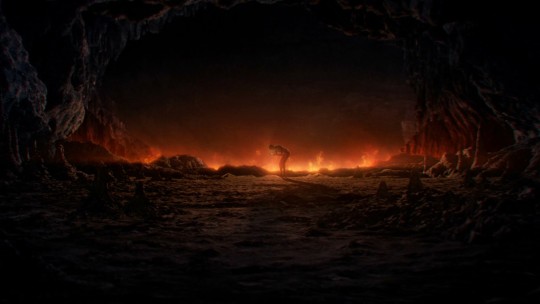
Gwyn, Izalith, and Nito would go on to defeat the dragons and begin the Age of Fire, but in time, the First Flame that sustained it began to fade, heralding the onset of the Age of Dark, where humanity would rule. Unable to let go of the age had fought for, and terrified of what the Age of Dark might involve, Gwyn decided to Link the Fire, burning himself on it as fuel. This, we are told, is the First Sin -- the Age of Fire was never meant to last forever, and it was always meant to fade into the Age of Dark, and Gwyn’s prolonging of it traps the world in a vicious cycle, preventing the Age of Fire from truly ending, forcing person after person to come and link the Fire in turn as their predecessors burn out, while the world decays around them.
Dark Souls III comes crashing in after countless cycles, each one less effective than the last. The Fire is fading once more, and there is nobody to Link it this time. In desperation, the bell at Firelink Shrine is rung, resurrecting five (or four, there’s some contention over whether Lothric ever linked the Fire, but I believe that he did and that the references to him ‘not taking his throne’ refer to him not returning to link it a second time) Lords of Cinder, people who have linked the Fire in the past, to all burn on it again, or else surrender their fires and their kingdoms to someone else.
With the exception of one, Ludleth, all of the Lords of Cinder refuse to return to their thrones and link the Fire a second time, and so five Unkindled, people who attempted to link the Fire and failed, are resurrected to bring the Lords back to their thrones.
Every Unkindled Has A Corresponding Lord of Cinder: Anri, Hawkwood, and Siegward.
So, the theory goes, every Unkindled is matched against a Lord of Cinder. This makes perfect sense, but it’s true in multiple ways: Each Unkindled is someone that Lord knew before they became a Lord, but each Unkindled’s story and history also parallels their Lord.
Aldrich, Saint of the Deep, was a cleric of the Way of White who discovered a taste for human flesh. Devouring countless victims, he bloated, then softened into a black sludge, becoming something inhuman, and it is heavily indicated that he was captured and forced to link the Flame. Upon being resurrected, he received visions of an Age of Deep Seas, and chose to force the fading of the Flame by devouring the gods themselves -- starting with Gwyndolin, Gwyn’s son.
Anri of Astora, meanwhile, was once a captive of Aldrich, held prisoner as a child, one of his future meals. They, and another captive named Horace, escaped, and evidence suggests they were instrumental in capturing Aldrich and forcing him to link the Flame. It’s not clear how Anri ended up trying to link it, but in the aftermath of their resurrection, they became an adherent of the Sable Church, a church wholly opposite to the Way of White, which believes in usurping the Flame.
The Abyss Watchers were a caravan of undead who roamed in search of the Abyss, a kind of malevolent wellspring of Humanity, inspired by the legend of Artorias the Abyss Walker. It is said that when a city showed the first signs of the Abyss, the Watchers would emerge and bury it. And yet, like Artorias, it seems they eventually began to fall to the Abyss themselves -- and rather than allow that, they linked the Flame, burning themselves as fuel. The First Flame did once contain the same Dark Soul that gave rise to the Abyss, after all. Upon resurrection, they have entire lost their minds to the Abyss, endlessly fighting each other in the depths of Farron Keep.
Hawkwood the Deserter, meanwhile, is a deserter from the Abyss Watchers. Choosing to fight with a sword and shield instead of their customary sword and dagger, he was ridiculed and despised as a coward, a judgement that would later be proven true when he abandoned them, perhaps out of fear of the Abyss encroaching on them. Hawkwood is driven by a fear of death and a hatred of his own cowardice, and we can make an educated guess and say he tried to link the Flame in order to survive in some form, to make a mark on history that would finally win him people’s admiration -- but he fails, and becomes ash. Upon being resurrected, Hawkwood is fatalistic, claiming that it’s impossible for Unkindled to defeat the Lords, but he does eventually find a purpose, as he attempts to seek the immortality of the dragons. Where the Watchers were honourable, group-minded, and didn’t fear death, Hawkwood seeks immortality to be free from his fear, and he seeks it for himself and only himself.
Yhorm the Giant was once the king of the Profaned Capital. Once, the people of the Capital were ruled over by a great warlord who had conquered many kingdoms -- but one day, they found themselves without a ruler and protector, and so they turned to Yhorm, the warlord’s descendant. While Yhorm was by all accounts a wise king and a fierce protector, he was derided by his people, who seemed to resent and doubt him. Eventually, however, an ancient curse awoke in a group of oracles within the Capital, and from them was born the Profane Flame, an ever-burning fire that consumed people’s hearts. It’s not clear what the Profane Flame is, but clearly it (like the Chaos Flame before it) was linked to the First Flame, and may have even been an attempt at recreating it. Either way, Yhorm believed he could calm it by linking the first Flame, and did so -- only for the first Flame to run out of control and rain fire over the city, consuming every human within it. Upon being resurrected, Yhorm saw the futility of what he had done, and settled in to his throne, surrounded by the burnt bodies of his people, to await his friend.
Siegward was an honourable knight of Catarina, and a good friend to Yhorm. At some point in their friendship, Yhorm took two Storm Ruler swords, which he was vulnerable to, gifting one to the people of the Capital and the other to Siegward. He made Siegward swear an oath that if Yhorm ever strayed from his duty, Siegward would come for him -- and with them both resurrected, Siegward does exactly that, or at least, he tries to. As with the others, it’s not clear why Siegward tried to link the Flame, but we can speculate that perhaps he did it to preserve his home of Catalina, or perhaps it was to delay the inevitable time when Yhorm would be resurrected to burn again. Yhorm and Siegward are both honourable, dutiful people, but while Yhorm abandons his duty when he sees the futility of what he did, Siegward never does. An oath is an oath, after all, and he swore one to Yhorm.
I’m spending so much time going over this to make it clear that, apart from each Unkindled and Lord being linked, they also form two halves of a wider narrative. Aldrich and Anri make up to sides of a story about how faith can corrupt or inspire; the Abyss Watchers and Hawkwood are two sides of a story about bravery and what bravery really means; and Yhorm and Siegward are two sides of a story about duty and futility, and especially what duty means when fulfilling your duty achieves nothing of value.
So that leaves two Lords, Lothric/Lorien and Ludleth, and two Unkindled, Elfriede of Londor and the Ashen One.
Elfriede and Lothric.
We’ll split this into two halves: How things likely played out narratively, and how they match up thematically.
So, Lothric, younger prince of the kingdom of Lothric, was born to link the Flame. From birth, likely even from conception, that was his purpose: He would grow, take the throne, and at the appropriate time, literally actually set himself on fire to keep the world warm.
His older brother, Lorien, was a great swordsman and knight, who had even defeated the Demon Prince (ostensibly), a battle that had charred the blade of his greatsword black. His sister, Gertrude, was -- well, we’ll get to her. But Lothric, unlike his siblings, was born sickly and frail in both mind and body.
It is said that as he was growing up, Lothric had a tutor, a scholar who instilled in him a deep doubt about the Fire-Linking ritual. At the same time, Gertrude was visited upon by angels, being struck blind and mute, and began to write the texts that would inspire the heretical Angelic Faith.
The Angelic Faith, we know, is actually either the same as or closely related to the faith of the Sable Church of Londor -- the pilgrims of Londor seemingly, if they can make it close enough to the end of the world, become angels.
Similarly, I would posit that Lothric’s tutor was actually Friede, or Elfriede of the Sable Church.
(This is a tactic we see her use elsewhere, after all, almost exactly, later on in the story. When encountered in the Painted World of Ariandel, Friede has ingratiated herself with the painter Ariandel, and convinced him to let the Painted World rot. She doesn’t do this out of spite or malice: She’s driven by genuine kindness because, as a Painted World falls to rot, it is set ablaze to clear the way for a new Painted World. For Friede, who came from outside the painting, setting fire to the painting seems like a terribly cruel thing.)
Friede fits almost too perfectly. She is a scholar, after all, seemingly well-educated in matters of history and cosmology, and a swordswoman who might have been hired to be Lothric’s (sadly useless, as he was too weak to wield the sword made for him) swordsmanship tutor. She is a founder of the Sable Church, perfectly positioned to have introduced the Angelic Faith to Gertrude. And she is wracked with guilt over a promise she made to protect someone, only to have to resort to violence to do so -- reason enough, then, for her to suggest a gentler approach to making sure Lothric doesn’t link the Flame.
Most importantly, though, she is an Unkindled, which means she is linked with a Lord of Cinder. It must be either Lothric or Ludleth, and we’ll get to why it makes more sense for it to be Lothric in a bit.
So she becomes his tutor, she places the seeds of doubt in him, she helps Gertrude become a would-be prophet of sorts. But Friede, we’re told, is kind. As Yuria says, her kindness wore upon her principles. Her principles, here, are allowing the Flame to be usurped or snuffed out. So, with that in mind, how would her kindness wear upon that? We can assume the end result of it was her attempting to link the Flame, going against all her principles in the process, but who was she being kind to while doing so?
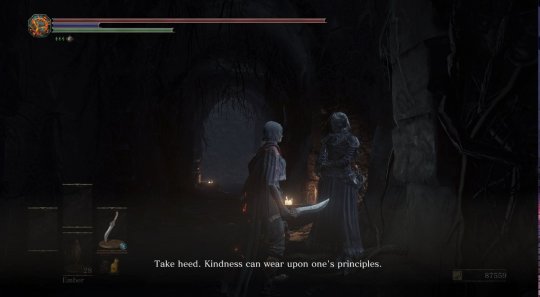
It’s not Ludleth. Ludleth is a powerful sorcerer, and so eager and fervent in his desire to see the Age of Fire continue that he cuts off his own legs to ensure he won’t flee. What use does he have for kindness?
Lothric, though, poor Lothric, has been raised from birth for the sole purpose of being burned alive for years, or maybe centuries. He is sick and frail, kept isolated from the rest of the world, and this torment waiting for him, a torment so terrible that even Ludleth can be heard begging in his sleep for the pain to stop, isn’t even one he can take on his own. Lorien has already figured this out, figured out that Lothric is too weak to link the Flame on his own, and that someone would have to share in the Fire-linking.
Friede, we are told, is kind. So doesn’t it make the most sense that, seeing Lothric and Lorien doomed to this terrible fate, she steps in and links the Flame for them? If the Flame is linked already, then there’s no need for them to sacrifice themselves.
Except Friede fails. She is burned to ash, the Flame isn’t sustained by her, and eventually Lorien carries Lothric into the Kiln, and they burn together. The experience breaks Lorien’s mind and body completely, and when they are resurrected, Lothric wants nothing to do with the Flame, content to simply watch it fade alongside his brother.
Friede, meanwhile, is resurrected as well, but flees into the Painted World. Making it a new home, she, perhaps not fully understanding the Painted World’s own cycle, seeks to sustain it indefinitely, even as it falls to rot. It’s worth noting that this is the opposite of the Sable Church’s views in the real world: Letting the Painted World rot, sustaining the current painting at any cost, is analogous to linking the Flame and sustaining the Age of Fire; whereas burning the painting and creating a new one is analogous to the transition to a new age that Yuria and Lilliane hope for.
Two halves of the same story. Friede’s kindness sees her betray her sisters and her principles; Lothric and Lorien’s kindness binds them closer together, even as it leads to their ruin.
Of course, they’re the easy pair to justify. There’s another one, though: The Ashen One is also an Unkindled, and there’s only one Lord left for them to be linked to.
The Ashen One and Ludleth.
At first blush, it seems utterly impossible for the Ashen One and Ludleth to be the last pair. Ludleth doesn’t recognise the Ashen One, he introduces himself, it’s fairly clear that the two of them never met before they were both resurrected, probably never even heard the other one’s name. They aren’t friends or enemies or even acquaintances, they’re total strangers.
Or, at least, Ludleth is a stranger to the Ashen One. The Ashen One has never met Ludleth before, but, while he doesn’t realise it, Ludleth does know the Ashen One. In fact, Ludleth linked the Flame because, and only because, of the Ashen One. The Ashen One is the single most important person in Ludleth’s life, even though they have never seen each other.
Because Ludleth hasn’t seen the Ashen One, but someone has.
“ Ahh. Found her, did we? And the black eyes that shimmer within, I see? Tis as if it were but yesterday. We did all we could to spare her from them. Much has happened since. Mayhap I should apprise thee... Of what the thin light of these eyes might reveal to the eyeless Firekeeper. Scenes of betrayal, things never intended for her ken, visions of... this age's end..."
“The eyes show a world destitute of fire, a barren plane of endless darkness. A place born of betrayal. So I will'd myself Lord, to link the fire, to paint a new vision. What is thine intent?"

In one ending, arguably the true ending, of Dark Souls III, the Ashen One can betray the Firekeeper and choose to usurp the Flame, ushering in a new Age, an age of -- something that isn’t quite the Age of Fire or the Age of Dark.
The previous Firekeeper saw a vision of this, in which the pilgrims of Londor are kneeling for the Usurper, who has betrayed the Firekeeper. We know that she told Ludleth about this vision. But Ludleth has never seen this vision. He doesn’t know who the Usurper is, he doesn’t know what they look like.
Nevertheless, his terror and outrage at what the Usurper did prompted him to throw the Firekeeper from the top of the belltower, and link the Flame. He’s not, in truth, a worthy candidate for the Flame -- you must be a monarch to link the Flame, and Ludleth is just a humble pygmy. But he has power, and a ring made from a Soulfeeder, and with that power and the power of the Flame, he reshapes the land, raising the High Wall of Lothric to block the passage of the pilgrims of Londor as they try to reach the Kiln of the First Flame. After all, he knows that the pilgrims of Londor are a part of this, so surely the Usurper is among them.
If there’s any doubt that Ludleth created the High Wall of Lothric, I will point you to this:
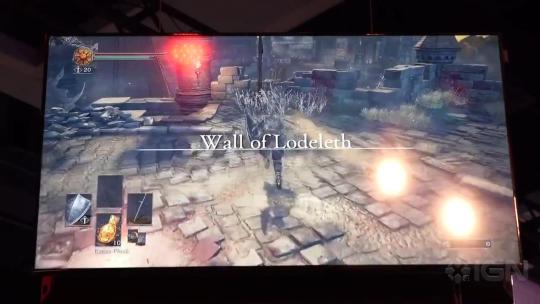
(Pictured: The beta version of Dark Souls III, where the High Wall of Lothric is the ‘Wall of Lodeleth.’)
Like Gwyn, Ludleth is willing to burn for what he believes. But him alone isn’t enough, so he uses the Flame to make more changes: He uses it to ring the Bell, awakening Aldrich, the Abyss Watchers, Yhorm, and I believe Lothric and Lorien. When they don’t return to their thrones, five Unkindled are raised: Anri, Hawkwood, Siegward, Friede and the Ashen One, a nameless undead who tried and failed to link the Flame long ago and was of no importance to anyone.
Making their way through Lothric, the Ashen One will inevitably encounter the pilgrims, most of them dead, at the edge of the High Wall. One is alive, though, Yoel, and if you let him, Yoel will lead the Ashen One to Yuria, the Sable Church, and ultimately, usurping the Flame.
Despite never having met, the Ashen One and Ludleth are intimately tied together. Ludleth links the Fire because of you, to try and stop you, and in doing so, he creates the conditions necessary for you to succeed. In true tragic fashion, his knowledge of the future comes back around to bite him.
But thematically, the two are parallels as well. Ludleth is unimportant: He’s not a king, he’s probably not even a Pygmy Lord (although if he was, what would it matter, outside the Ringed City as he is), he’s just a small, unimportant pygmy. What sets him apart is his determination: Ludleth believes, truly believes, in the Age of Fire, with a zeal that is probably matched only by Gwyn himself. Ludleth is so determined to see the Age of Fire continue that he doesn’t just burn once, he cuts off his own legs to keep himself from running from burning again.
Of all the Lords of Cinder in game, he is the only one who went to his fate entirely willingly, without being either literally forced (Aldrich), raised for the sole purpose of burning (Lothric), facing the certain loss of sanity due to the Abyss (the Watchers), or facing the destruction of his home and the derision of his people (Yhorm) -- and then he does it a second time.
And isn’t that kind of exactly the same as the Ashen One?
The Ashen One is nobody, a nameless undead who failed to link the Flame. They have no place in history, nobody remembers them, and as far as we can tell they achieved nothing of value in their life. If you play through the game, though, the Ashen One will, through sheer grit, defeat four Lords of Cinder, topple the reign of Pontiff Sulyvahn, set fire to the Painted World so it can be renewed, and defeat the Soul of Cinder, the deific manifestation of every Lord. They never lose their mind, no matter how much they hollow, and they, of all the Unkindled, are the only one to even come close to bringing the absentee Lords back to their thrones -- they’re one of only three to even try.
Like Ludleth, the Ashen One is a determined nobody. Unlike Ludleth, though, the Ashen One isn’t content with just eking out a few more years for the Age of Fire. They would rather break the cycle.
44 notes
·
View notes
Photo
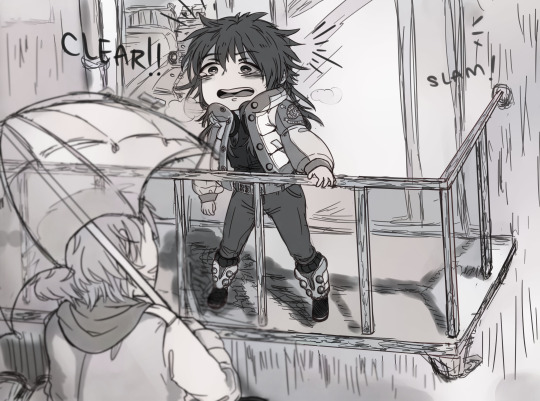
“I heard your voice, so I came... Aoba-san.”
Hooo-boy, if that doesn’t get me emotional every single time. Call it my bias for eccentric bundles of sunshine and softness, or my crippling weakness for the secretly-handsome-and-devastatingly-earnest type, but you can’t change my mind: Clear is, hands down, DMMD’s best love interest. Character development-wise, thematically, romantically, he nails every trial thrown at him, gets his man, and proceeds to break your heart in the tenderest, sincerest way possible. I am hopping with Huge Fan Energy, so this post is gonna be unapologetically long and self-indulgent and grossly enthusiastic. Yeeeee.
————
Look, DMMD meta analysis has been done to death, I get it. This game is old. But I think it stands as testament to its excellent production that it’s still a game worth revisiting years later — especially during these times when social contact is so hard pressed to come by and we all rabidly devour digital media like a horde of screeching feral gremlins. (Have you seen Netflix’s stock value now? The exploding MMO server populations? Astonishing.) It’s pure, simple human nature to want to connect, to cling to members of our network out of biological imperative and our psychological dependency on each other. As cold and primitive at that sounds, social contact also fulfills us on a higher level: the community is always stronger than the individual; genuine trust begets a mutually supportive relationship of exchange and evolution. People learn from each other, and grow into stronger, wiser, better versions of themselves.
Yeah, I’m being deliberately obtuse about this. Of course I’m talking about Clear. Clear, who is a robot. Clear, who is nearly childlike in his insatiable curiosity regarding the human condition.
And it’s a classic literary tactic, using non-human entities to question the intangible constructs of a concept like ‘humanity’ — think Frankenstein, or Tokyo Ghoul, or Detroit: Become Human, among so, so many works in various media — all tackling that question from countless angles, all with varying measures of success. What does it mean to be human? To be good? Who are we, and where do we stand in the grand scheme of things? Is there even a scheme to follow? … Wait, what?
Jokes aside, there are so many ways that the whole approaching-human-yet-not-quite-there schtick can be abused into edgy, joyless existential griping. Nothing wrong with that if it’s what you’re looking for, except that we’re talking about a boys’ love game here. But DMMD neatly, sweetly side steps that particular wrinkle, giving us a wonderfully grounded character to work with as a result.
Character Design — a see-through secret
Let’s start small: Clear’s design and premise. Unlike so many other lost, clueless robo-lambs across media, Clear does have a small guiding presence early on in his life. It takes the form of his grandfather, who teaches Clear about the world while also sheltering him from his origins. It means he learns enough to blend sufficiently into society; it also means that Clear has even more questions that sprout from his limited understanding of the world.
Told that he must never remove his mask lest he expose his identity as a non-human, Clear’s perpetual fear of rejection for what he is drives much of his eccentricity and challenges him throughout much of his route. As for the player, the mystery of what lies underneath his mask is a carrot that the writers get to dangle until the peak moment of emotional payoff. Even if it’s not hard to guess that there’s probably a hottie of legendary proportions stuck under there, there’s still significance in waiting for that good moment to happen. And when it does, it feels great.
His upbringing contextualizes and affirms his odd choice of fashion: deliberately generic, bashfully covered from the public eye, and colored nearly in pure white - the quintessential signal of a blank slate, of innocence. Contrasted with the rest of DMMD’s flashy, colorful crew, Clear is probably the most difficult to read on a superficial scale, not falling into the fiery, bare-chest sex appeal of a womanizer, or the techno-nerd rebel aesthetic that Noiz somehow rocks. Goofy weirdo? Possibly a serial killer? Honestly, both seem plausible at the start.
And that’s the funny thing, because as damn hard as he tries to physically cover himself up from society, Clear is irrepressibly true to his name: transparent to a fault. He’s a walking, talking contradiction, and it’s not hard to realize that this mysterious, masked stranger… is really just an open book. By far the most effusive and straightforward of the entire cast, his actions are wildly unconventional and sometimes wholly inexplicable. But given time to explain himself, he is always, always sincere in his intentions — and unlike the rest of the love interests, naturally inclined to offer bits of himself to Aoba. It doesn’t take the entire character arc to figure out his big, bad secret — our main character gets an inkling about halfway through his route — and what’s even better is that he embraces it, understanding that his abilities also allow him to protect what he cherishes: Aoba.
So what if he doesn’t fit into an easily recognizable box of daydream boyfriend material? He’s contradictory, and contradiction is interesting. Dons a gas mask, but isn’t an edgelord. Blandly dressed, but ridiculously charming. Unreadable and modestly intimidating — until he opens his mouth. Even without the benefit of traversing his route, there’s already so much good stuff to work with, and sure as hell, you’re kept guessing all the way to the end.
Character Development — from reckless devotion into complaisant subservience, complaisant subservience into mutual understanding. And then, of course: free will, and true love.
At its core, DMMD is about a dude with magic mind-melding powers and his merry band of attractive men with — surprise! — crippling emotional baggage. Each route follows the same pattern, simply remixing the individual character interactions and the pace of the program: Aoba finds himself isolated with the love interest, faces various communication issues varying on the scale of frustrating to downright dangerous, wanders into a sketchy section of Platinum Jail, bonds with the love interest over shared duress, breaks into the Oval Tower, faces mental assault by the big bad — and finally, finally, destroys those internal demons plaguing the love interest, releasing the couple onto the path of a real heart-to-heart conversation. And then, you know, the lovey-dovey stuff.
Here’s the thing: as far as romantic progression goes, it’s really not a bad structure. There’s room to bump heads, but also to bond. The Scrap scene is a thematically cohesive and clever way to squeeze in the full breadth of character backstory while simultaneously advancing the plot. In this part, Aoba must become the hero to each of his love interests and save them from themselves. Having become privy to each other’s deepest thoughts and reaching a mutual understanding of each other, their feelings afterwards slide much more naturally into romantic territory. They break free of Oval Tower, make their way home, and have hot, emotionally fulfilling sex or otherwise some variation on the last few steps. The end.
That is, except for Clear.
Clear’s route is refreshing in that he needs none of these things — the climax of his emotional arc actually comes a little after the halfway point of his route. When Clear’s true origins are revealed, he comes entirely clean to Aoba, fighting against his fear of rejection but also trusting that Aoba will listen. It’s a quiet, vulnerable moment, rather than the action-packed tension we normally experience during a Scrap scene.
That doesn’t mean it’s prematurely written in — it simply means that he reaches his potential faster than the other characters. Because of that, he’s free to pursue the next level of his route’s development much, much sooner in the timeline: he overcomes his fears of his appearance, he confesses his love to Aoba, he leaves the confines of a largely dubious master-servant relationship and allows himself to be Aoba’s equal. Clear’s sprite art mirrors his emotional transformation all the way through, exposing him to the literal bone — and Aoba’s affection for him doesn’t change a single bit. Beautiful.
The whammy of incredible moments doesn’t just stop there, though. I don’t exactly recall the order the routes DMMD is ideally meant to be played in, but I believe Clear’s is meant to be last. And if you do, I can guarantee that it becomes a hugely delightful gameplay experience — in order to achieve his good ending, you must do absolutely nothing with Scrap. It doesn’t just subvert our player expectations of proactively clicking and interacting with our love interests; it grabs the story by its thematic reins and yanks it all back to the forefront of our scene.
In every route besides Clear’s, Scrap is a tool used to insert Aoba’s influence into and interfere with his target’s mind. Using his powers of destruction, Aoba is able to prune whatever maligned thoughts are harming his target; in any conventional situation, using Scrap is the right choice.
But one of the central problems in Clear’s route is his conflict between the impulses of his conditioning and his desire to live freely as a human would. Breaking free of Toue’s programming is what initially made him unique; growing beyond the rules imposed by his grandfather is what makes him human. In the final conflict scene, Clear’s decision to destroy his key-lock is an action of true autonomy, made with perfect understanding of the consequences and a sincere, selflessly selfish desire to protect someone he loves. In order to receive his good end, you have to respect his decision. It doesn’t matter which option you pick — by using Scrap, Aoba turns his back on every positive choice he made with Clear and attempts to exert his authority over him. This is Aoba becoming Toue; this is Aoba trying to reinstate himself as ‘Master’ right as he approved Clear as his equal. That’s blatant hypocrisy, and it doesn’t matter if Aoba is trying to do it for Clear’s ‘own good’ — that’s not Aoba’s call to make. If you truly wish to respect Clear’s free will, you will stand by. This is the truth of the moment: Clear has no emotional blockages that Aoba needs to fix. Believe in him, just as he believed in you.
The path to his heart is, and always has been, clear. Scrap was never needed from the start.
While Aoba might be the main character, Clear is undeniably a hero in his own route just as much. Tirelessly earnest and always curious, he leaps headlong into the unknown and emerges with his newfound enlightenment. He’s unafraid of weathering trials, even to the point of accepting death, and returns anew from oblivion to a sweet, cathartic ending. That’s about as textbook hero’s journey as it gets — if that doesn’t make him unquestionably, certifiably, unconditionally human, then I will scream.
And only finally… there is the free end. The final CG is like a throwback to our first impression of him: indistinct, purposefully obscured from proper view. But this time, we know better — and so does Aoba. Looks were never what mattered in Clear’s route. If you were patient, and you were open-minded, and you listened… well, what we realize now is that Clear was doing the exact same thing for you, too.
From a carefree, aimless robot-man with only the gimmick of “eccentric ditz” to carry him forward, we get a supremely more interesting character by the end: a man who has graduated from the well-intentioned but claustrophobic conditioning of his childhood; a weapon who has defied the imperatives placed on him by his creator’s programming; a wanderer who has, through unconditional patience and empathy, discovered love, and striven to become a better person for it. Who was it that ever doubted Clear’s character? He’s the goddamn goodest boy that ever wanted to be a real boy. Of course Clear is human. And in fact, he does it better than every single one of the actually human love interests. You can’t change my mind.
The Romance — kindness is really fucking attractive, okay.
Like I’ve said earlier, I have my Big Fan Blinds stuck on pretty tight. I might be conjuring sparks from thin air. But I think every choice was a deliberate creative decision on the writers’ part, and they deserve all the kudos for it — I’m just the lucky player who gets to enjoy it. But aside from Noiz (who I also think is a perfect darling as well — I could go on and on about him), Clear’s route is a model example for consent and healthy relationships in VN storytelling. This is reciprocated on both sides: never does Aoba infringe on Clear’s boundaries, and neither does Clear. They’re sensitive to each other’s needs and concerns; they ask for permission and stop when it isn’t granted (and when it is, boy do they get frisky — I’m not complaining!) I don’t need to say much more, because I think that consent is both fantastic and yes, incredibly hot (the scene in DMMD is tons more sad, go play Re:connect!). Good writing shows off the massive erotic potential enthusiastic consent puts into intimacy, and Aoba’s and Clear’s relationship is honestly a dream playground. The point is, I think Aoba and Clear genuinely do find equal balance in their relationship by the end of his route (and certainly through Re:connect). If you follow through Re:connect’s storyline, there’s even more thematic richness that comes through in the form of Clear’s greatest asset: communication. The couple get to discuss the long-term implications of them being together; they both offer concerns, points, and assurances to the other, and it’s just a soft, honest moment not so unlike the worries of a real relationship. Hearing is kind of Clear’s motif sense, but it’s really great to see that Aoba also subtly picks it up, really flexes his own communication skills to better engage with Clear.
Point is, Clear’s route spoke to me on a lot of little levels. Design-wise, he’s already got a ton going for him, and his story builds upon it rather than against it, enriching his development and grounding him a little more solidly in the DMMD universe (and in my heart). His route, aside from being emotionally ruinous, carries a pretty solid chunk of world-building (only beaten out by Mink’s and Ren’s, probably), and the romance feels organic, healthy, and realistic. He’s not the only one with an excellent route, but he’s my favorite. If you read through all of this, you’re a real trooper and I’m extremely impressed. Thanks for tuning in. Peace.
#dramatical murder#dmmd#aoba seragaki#clear#dmmd clear#long ass emotional screeching#lOL I FORGOT TO DRAW IN THE UMBRELLA HANDLE ahA#fixed
90 notes
·
View notes
Text
November Roundup
Some writing success this month - I finished and posted a new chapter for Against the Dying of the Light, and made progress on The Lady of the Lake and Turn Your Face to the Sun. I didn’t work much on my novel, but I did do some editing on the first third so that’s progress.
Words written this month: 6647
Total this year: 67,514
November books
Girl, Woman, Other by Bernadine Evaristo - joint winner of the 2019 Booker Prize (with The Testaments by Margaret Atwood) this was an engrossing and interesting read. Stylistically unusual formatting and scant use of punctuation that is a bit jarring at first, but you quickly adapt as you read. There’s no plot as such - instead the story is formed by vignettes of twelve black women and their disparate yet interconnected lives. We have mothers and daughters, close friends, teachers and students, although the connections aren’t always obvious at first - we can be exposed to a character briefly in the story of another with no idea that she will be a focus later on. It’s very skillfully done, to the point whereupon finishing I wanted immediately to re-read (but alas, it was already overdue back to the library). There is so much ground covered that we are really only given a glimpse into the characters lives, but there is a diversity of intergenerational perspectives of the African diaspora in the UK, and I highly recommend.
The Evening and the Morning by Ken Follett - after finishing The Pillars of the Earth I had intended to read the sequel, but this was available on the library shelf and I had to place a hold on World Without End, so the prequel came first. Set sixty years before the Conquest (150 before Pillars) it primarily addresses the growth of the hamlet of Dreng’s Ferry into the town of Kingsbridge, through the lives of a monk with a strong moral code, a clever and beautiful noblewoman, and a skilled builder, working against the machinations of an evil bishop. Sound familiar? This is Follet’s most recent work, and I do wonder if he’s running out of ideas as this covers very similar thematic ground.
Ragna is a compelling female character, but once again the romance-that-cannot-be with Edgar is tepid, Aldred is a very watered down version of Prior Philip, and there’s no grand framing device such as building the cathedral to really tie to all together (although things do Get Built, and it’s interesting but not on the level of Pillars). This is the tail end of the Dark Ages and it shows - Viking raids, slavery, infanticide - and while it seems Follett’s style is to put his characters through much tragedy and tribulation before their happy ending, I wish writers would stop going to the rape well so readily. But at least the sexual violence isn’t as...lasciviously written as in Pillars? Scant praise, I know. But Follett’s strength in drawing the reader into the world and time period is on display, made even more interesting in this era about which we know very little.
Women and Leadership by Julia Gillard and Ngozi Okonjo-Iweala - I have a great deal of respect for Julia Gillard, Australia’s first female Prime Minister who was treated utterly shamefully during her tenure and never got the credit she deserved, perhaps excepting the reaction to her iconic “misogny speech” whichyou can enjoy in full here:
youtube
Ngozi Okonjo-Iweala was the first woman to be Minister of Finance and Foreign Affairs in Nigeria, was also the former Managing Director of the World Bank, and currently a candidate for Director-General of the WTO.
This is an interesting examination of women in leadership roles, comparing and contrasting the lives and experiences of a select few including (those I found the most interesting) Ellen Sirleaf, the first female President of Liberia, Joyce Banda, the first female President of Malawi, New Zealand’s current Prime Minister Jacinda Ardern, and of course, Gillard and Okonjo-Iweala themselves.
November shows/movies
The Vow and Seduced: Inside the NXIVM Cult - I’ve been following the NXIVM case for a while now, when the news broke in 2017 I was surprised and intrigued that it involved actresses from some of my fandom interests - Alison Mack (Smallville), Grace Park and Nikki Clyne (Battlestar Galactica), and Bonnie Piasse (Star Wars). Uncovered: Escaping NXIVM is an excellent podcast from that point in time that’s well worth a listen. There’s been a lot of discussion comparing these two documentaries and which one is better, but I feel they’re both worthwhile.
The Vow gives a primer of NXIVM as a predatory “self improvement” pyramid scheme/cult run by human garbage Keith Reniere, from the perspective of former members turned whistleblowers Bonnie Piasse, who first suspected things were wrong, her husband Mark Vicente who was high up in the organisation, and Sarah Edmondson who was a member of DOS, the secret group within NXIVM that involved branding and sex trafficking. Seduced gives more insight into the depravity and criminality of DOS from the pov of India Oxenburg, just 19 when she joined the group and who became Alison Mack’s “slave” in DOS - she was required to give monthly “collateral” in the form of explicit photographs or incriminating information about herself or her family, had to ask Mack’s permission before eating anything (only 500 calories allowed per day), was ordered to have sex with Reniere, and other horrific treatment - Mack herself was slave to Reniere (as was Nikki Clyne) and there were even more horrific crimes including rape and imprisonments of underage girls.
Of course each show has an interest in portraying its subjects as less culpable than perhaps they were (there were people above and below them all in the pyramid after all) - Vicente and Edmondson in The Vow and Oxenburg in Seduced, but what I did appreciate about Seduced was the multiple experts to explain how and why people were indoctrinated into this cult, and why it was so difficult to break free from it. This is a story of victims who were also victimisers and all the complications that come along with that, although I’m not sure any of these people are in the place yet to really reckon with what happened and all need a lot of therapy.
Focusing on individual journeys also narrows the scope - there are other NXIVM members interviewed I would have liked to have heard a lot more from. There is also a lot of jumping back and forth in time in both docos so the timeline is never quite clear unless you do further research. I would actually like to see another documentary one day a bit further removed from events dealing with the whole thing from start to finish from a neutral perspective. The good news is that Reniere was recently sentenced to 120 years in prison so he can rot.
I saw value in both, but you’re only going to watch one of these, I would say go for Seduced - if you’re interested in as much information as possible, watch The Vow first to get a primer on all the main players and then Seduced for the full(er) story.
The Crown (season 4) - While I love absolutely everything Olivia Coleman does, I thought it took a while for her to settle in as the Queen last season and it’s almost sad that she really nailed it this season, just in time for the next cast changeover (but I also love everything Imelda Staunton does so...) This may be an unpopular opinion, but I wasn’t completely sold on Gillian Anderson as Thatcher - yes I know she sounded somewhat Like That, but for me the performance was a little too...affected? (and someone get her a cough drop, please!)
It is also an almost sympathetic portrayal of Thatcher - even though it does demonstrate her classism and internalised misogyny, it doesn’t really explore the full impact of Thatcherism, why she was such a polarising figure to the extent that some would react like this to her death:
youtube
But I suppose it’s called The Crown, not The PM.
Emma Corrin is wonderful as Diana, and boy do they take no prisoners with Charles (or the other male spawn). I was actually surprised at how terrible they made Charles seem rather than both sidesing it as I had expected (but perhaps that’s being saved for season 5). It does hammer home just how young Diana was when they were married (19 to Charles’ 32), how incompatible they were and the toxicity of their marriage (standard disclaimer yes it’s all fictionalised blah blah). The performances are exceptional across the board - Tobias Menzies and Josh O’Conner were also standouts and it’s a shame to see them go.
I was however disappointed to see that the episode covering Charles and Di’s tour of Australia was not only called “Terra Nullius” but the term was used as a very tone deaf metephor that modern Australia was no longer “nobody’s land/country”. For those who aren’t aware, terra nullius was the disgraceful legal justification for British invasion/colonisation of Australia despite the fact that the Indigenous people had inhabited the continent for 50,000 years or more. While the tour was pre-Mabo (the decision that overturned the doctrine of terra nullius and acknowledged native title), there was no need to use this to make the point, especially when there was no mention at all of the true meaning/implication of the term.
The Spanish Princess (season 2, episodes 4-8)- Sigh. I guess I’m more annoyed at the squandered potential of this show, since the purpose ostensibly was to focus on the time before The Great Matter and give Katherine “her due” - and instead they went and made her the most unsympathetic, unlikeable character in the whole damn show. (Spoilers) She literally rips Bessie Blount’s baby from her body and, heedless to a mother’s pleas to hold her child, runs off to Henry so she can present him with “a son”. I mean, what the actual fuck?
I’m not a stickler for historical accuracy so long as it’s accurate to the spirit of history (The Tudors had its flaws, but it threaded this needle most of the time), but this Katherine isn’t even a shadow of her historical figure - she’s not a troubled heroine, she’s cruel and vindictive, Margaret Pole is a sanctimonious prig, and Margaret Tudor does little but sneer and shout - the only one who comes out unscathed is Mary Tudor (the elder), and it’s only because she’s barely in it at all. It’s a shame because I like all of these actresses (especially Georgie Henley and Laura Carmichael) but they are just given dreck to work with.
This is not an issue with flawed characters, it’s the bizarre presentation of these characters that seems to want to be girl power rah rah, and yet at the same time feels utterly misogynistic by pitting the women against each other or making them spiteful, stupid, or crazy for The Drama. I realise this is based on Gregory so par for the course, but it feels particularly egregious here. (Spoilers) At one point Margaret Pole is banished from court by Henry, and because Katherine won’t help her (because she cant!) she decides to spill the beans about Katherine’s non-virginity. Yes, her revenge against the hated Tudors is...to give Henry exactly what he wants? Even though it will result in young Mary, who she loves and cares for, being disinherited? Girlboss!
This season also missed the opportunity to build on its predecessors The White Queen/Princess and show why it was so important to Henry to have a male heir - the Tudor reign wasn’t built on the firmest foundations and so needed uncontested transfer of power, at the time there was historic precedent that passing the throne to a daughter led to Anarchy, and wars of succession were very recent in everyone’s memory. At least no one was bleating about The Curse this time, which is actually kind of surprising, because the point of the stupid curse is the Tudor dynasty drama.
But it’s not all terrible. Lina and Oviedo are the best part of the show, and (spoilers) thankfully make it out alive. Both are a delight to watch and I wish the show had been just about them.
Oh well. One day maybe we’ll get the Katherine of Aragon show we deserve - at least I can say that the costumes were pretty, small consolation though it is.
7 notes
·
View notes
Note
Hey! I hope this isn't too forward of me but I've translated the newest KHUx update on my KH blog, theworldthatneverwas, and I'd love to see your opinion on the events (especially with the whole Ven/darkness thing!) I'm also happy to answer questions about my translation!
Hello! Thank you so much for hooking me up with the translation! It seems very clear from what I can glean and I am ready to dig in.
There’s.... a lot to unpack. If you read the implications of this update straight, then Darkness has been confirmed to be a force that can possess Ventus in some physical way and has, as a result, infiltrated the Union leaders by killing an intended member. But there are two schools of thought presented on the nature of this Darkness:
External Force:
Skuld asks if Darkness ‘disguised itself as Ava’. When discussing what happened, Ephemer says ‘someone’ tricked Ven. All of this assuming that Darkness is an external force. But our understanding of Re:mind tells that at least at some point Darkness becomes bound to Ven in someway but it doesn’t necessarily have to be from the very beginning.
Or Internal Force:
Yet, both the staging of the empty house scene with Strel’s flashback, and the auxiliary knowledge Re:mind, further support this ‘Split-Personality’ concept with Ven. Re;mind stages Darkness inside of Ven’s heart station and gives Vanitas a sentience claim that precedes his split. And within this update Brain and Ephemer’s reference Darkness hiding in people.I state in my theory that Darkness is not an external force preying upon Ventus but in fact a suppressed creation of Ven’s and I still believe this. The Missing Ache thematically suggests that Ven takes his dark feelings and smothers it, potentially funneling all of his heartache and pain into another venue. I also allude to his mysterious reaction to the introduction of PvP, not only as a means to bolster Ven’s innocence but as proof that he simply forgets or blocks out things that trouble him (he’s pacifistic and unwilling to ‘raise his blade against comrades’ as proof by his reverse grip). But this gets bigger than poor personal darkness management.
Brain and Ephemer specifically talk about the purpose of the Dandelion’s and the antithesis of their mission in this update.
Brain: So if only light is supposed to come to the new world, what wouldn’t we want to bring?
Darkness with an agenda. A scheme meant to hurt the larger effort of the Dandelions. And knowing that ‘Darkness’ connived against Maleficent for the liberation from the data-world, we can assume this is a very large and organized plot from Darkness.
If we assume these two facts to be true (Darkness serving from within Ven and Darkness having greater scope of ambitions), then Darkness’ connection to the Darkling phenomenon might have better support. This is, understanding Darklings as a legion purposed toward the spread of darkness with sentience (placing them above Heartless) but little identity. If Ventus has a Darkling form or Darkling alter-ego it would make sense why the Darkness inside of him has a greater perspective on the grand scheme of the Dandelion/Data-world plot. (Explicit Darkling connections with Ven come from Vanitas-Darkling visual similarities and KH3 boxart’s Darkling statue rising from Ven). This would ultimately provide a face to the dark-light conflict that the entire prewritten destiny is centered around. This force used as fodder to our keyblades now has a clear and sentient goal other than just basic destruction of light.
Ven, or his Darkness is that face. He is a sleeper agent to that ambition. A Darkling in human skin.
But honestly? Honestly Honestly...
Why... imply Ven’s culpability and not show it? Perhaps the exact nature of the connection with Darkness (be it external or internal) is a treasured reveal... but I’m suspicious of that because regardless of Darkness’s nature within Ven, Ven is proving his ignorance and innocence of the deed, therefore, removing the shock value of the reveal.
Why spoil the wham moment with vague confirmation? Unless Ven killing Strelitzia on the behest of Darkness isn’t the most treasured secret of this moment’s mystery.
And that’s where I turn to the only thing Ven does remember. Leaving the damn room with Ava. Some claim this is a fabricated memory. And once again in the dialogue does Brain announce his blind trust in Ava.
Brain: Plus, if Strelitzia is no longer with us, that’s evidence that it wasn’t Master Ava’s intention to replace her.
Translation: “Ava would never kill Strelitzia so she can’t possibly be behind this”
I am bothered to death by this blind faith because it feels like it’s being arbitrarily slammed over our heads. Ava isn’t capable of hurting her own. She isn’t capable of making hard choices for the good of the Dandelion’s.
Newsflash: Ava started the first war by lashing out at Luxu. She started the war as an unwitting pawn and intentionally defied the Masters directions in the hope that she could. She has a lot of blame on her shoulders already and a lot of gall. Don’t rule her out when trying to do good.
Ven walks in. Darkness kills Strelitzia. Ava and Ven walk out. Darkness in disguise??
Brain: The person you saw really was Master Ava, right?
Ventus: Yeah…
Let’s believe him. After all, Ven has no memory of this moment (hearkening to his bbs memory problems even!). Everyone in this recollection scene wants to believe that Ava is being impersonated or that memories are fake. But I say let’s believe this to be so darn true.
I think Ava and Darkness are working together to start the Keyblade War in data-Daybreak Town.
Why? I have a few theories for a different post. But if they are working together it might explain why Darkness has knowledge on the data-world and how to leave it. Also why Darkness might want to avoid Maleficent’s meddling as well.
Okay that went in a lot of directions. If there’s a line that doesn’t have as conclusive a meaning as I’m reading, let me know. I am terribly grateful for you bringing this to my attention and for your wonderful translations.
#kingdom hearts#khux#khux spoilers#ven sleeper agent theory#darkling ven#thank you so much for the ask#theflightlessphoenix
31 notes
·
View notes
Text
Camille Has Many KDrama Thoughts
As some of you have possibly noticed, I have recently fallen into a KDrama hole and I can’t get up, and I have just finished my 10th drama, which seems like less of an accomplishment than I thought now that I say it out loud, but anyway,
As a checkpoint/thinly veiled plug of some shows I love very much, here is a very long post with some of my thoughts on all the KDramas I’ve seen so far, as well as what’s next on my list, in case you too were interested in joining me in nonexistent fandom hell!
So firstly, all of the dramas I have watched to completion, in the order of how much I like them. First, my top five:
1. Sungkyunkwan Scandal (2010). My #1 favorite drama to date. I’ve probably watched it in full 4-5 times, and it’s still an absolute treat every time. Is it the best drama I’ve ever seen? Probably not. But it’s so fun and charming that it’s just gotta be at the top of my list.
The best way I can describe this drama is Ouran High School Host Club, except in Joseon era Korea, and instead of flirting with girls the main characters learn about Confucianism and solve mysteries and play sports (twice) and end up accidentally involved in a complicated political scandal. Also, that one text post about how Shang from Mulan is bi because he falls for Mulan while he thinks she’s a man...This drama has that, except actually canon. And while I won’t pretend this is show is a shining beacon of representation, there are multiple main characters who are explicitly not heterosexual and several others with very plausible queer readings, which earns it a very special place in my heart.
As for the actual premise of the show, it’s basically about a wonderfully determined and kind and clever but lower-class girl whose writing skills catch the eye of the most stubbornly strait-laced but idealistic aspiring politician-type on the planet. She ends up getting a one-way ticket to the most prestigious school in the country, except she has to pretend to be a man the entire time because women aren’t allowed to be educated at this time.
It’s a bit of a silly, cheesy show, and here are many wacky shenanigans, but the main cast is full of incredibly highly endearing and multifaceted characters, there is a lot of sexual confusion, the slowburn roommate romance has an incredible payoff, and it’s also full of deeply moving social commentary about class, privilege, and gender roles. This drama is a blast and I could go on and on about what I love about it, I absolutely adore it to pieces.
2. Six Flying Dragons (2015-2016). I debated between this and Tree With Deep Roots (next on my list, to which SFD is a prequel) as my #2 but I do think I want to place SFD higher just because it's the drama that I keep thinking about even after finishing it. of course, it has the dual advantages of 1) being released chronologically later (and having better production value, etc., because of this) and 2) being twice as long, but there’s just so much stuff to unpack with SFD that it makes me want to keep coming back to it.
The show is about the founding of the Joseon dynasty, and six individuals (half of whom are based on real historical figures and half fictional) whose lives are closely tied to the fall of the old regime and the revolution that brought in the new. It has an intricate, intensely political plotline based on the actual events that happened during this time, and though this may sound kind of boring if you’re like me and not super into history (admittedly, the pacing in the beginning is a tiny bit slow), it quickly picks up and becomes this dense web of character relations and political maneuvering. Though none of the major events should come as a surprise if you’ve seen TWDR or if you happen to already know the history it was based on, the show adds such a depth of humanity and emotion to every event and character that nothing ever feels boring or predictable. As a matter of fact, there are several events that were alluded to in TWDR that, when they actually happened in SFD, left me breathless--because although I 100% knew these were foregone conclusions that were coming up at some point, I still had a visceral moment of, “oh no, so that’s how that came to happen.”
But though I really enjoyed following the story of SFD and learning about the history behind it, the highlight of the show for me is definitely the great character arcs. I loved TWDR’s characters, too (especially Yi Do, So Yi, and obviously Moo Hyul), but with double the episode count SFD just has so much time for rich, dynamic character development, and I absolutely loved seeing how these characters grew and changed over time when their ideologies and fates collided in this turbulent and violent age: How young and ambitious Yi Bang Won eventually spiraled into a ruthless tyrant, how the naive and kind-hearted Moo Hyul struggled to retain his humanity in a bloody revolution that challenged his values and loyalties to the core, how the fiercely determined and idealistic Boon Yi grew into a pragmatic and capable leader who comes to realize what politics and power mean for her and her loved ones.
SFD was also everything I wanted as a prequel to TWDR--I loved seeing the contrasts between some of the TWDR characters and their younger selves in the SFD timeline: The hardened and ruthless Bang Won as a passionate and righteous adolescent, the cynical and resigned Bang Ji as a cowardly boy who grows into a traumatized and bitter young man, and my personal favorite character, the comically serious bodyguard Moo Hyul as the very model of the dopey, lovable himbo archetype. And though the ending was controversial among fans (particularly those who watched SFD first), I loved how it closed all the loops and tied it back to the events of TWDR, both providing that transition I wanted but also recontextualizing and adding new meaning to the original work. I think it's still a very good drama on its own, but this hand-off is what really sealed the deal for me personally, because it was not only super emotionally satisfying to watch how the stories connected, but it elevated TWDR to something even greater (suggesting that Yi Do and the events of TWDR was the culmination of everything the six dragons fought so long and hard for), which is exactly what I expect from a good prequel.
I’ve already talked so much about this drama but I also do need to mention that the soundtrack to SFD is A+, and the sword fights are sick as hell. There is also some romance, though it’s not really a focus--and all the pairings that do exist are extremely tragic, which is exactly up my alley. Overall, this is a hell of a historical drama, coming of age, villain origin story, and martial arts film in one, and I highly recommend it.
3. Tree With Deep Roots (2011). The sequel to SFD, though it aired first chronologically. Although this show isn’t one of those shows that I could rewatch once a year like SKKS or keep ruminating on like SFD, TWDR (much like Les Mis, or Fata Morgana) is thematically the kind of story that just makes my heart sing.
The story centers around the creation of Hangul, the Korean alphabet, by Yi Do (a.k.a., King Sejong the Great, who is the son and successor of Yi Bang Won, the main character of SFD) as well as two fictional childhood friends whose backstories and ambitions become central to the story of how and why this alphabet came to exist. Not only is the actual process of creating this alphabet absolutely fascinating from a linguistic and scientific POV, but the show dramatizes Yi Do’s motivations in a way that’s so incredibly touching and human--portraying the king as a soft-hearted and extremely charismatic yet fundamentally flawed and conflicted figure who tries so desperately to do right by his people.
The show explores both a number of personal themes like redemption, atonement, and vengeance, as well as broader societal themes such as the ethics of authority, the democratization of knowledge, and the power of language and literacy. Though the show never forgets to remind the audience of the bitter reality of actual history, it’s still a deeply idealistic show whose musings on social change and how to use privilege and power to make the world better are both elegant and poignant.
Romance definitely takes a backseat in TWDR, even more so than SFD, though this isn’t something I personally mind. There are, however, a lot of interesting politics surrounding the promulgation of the alphabet, including a string of high-profile assassinations--if SFD is historical/political-thriller-meets-action-film, then TWDR is historical/political-thriller-meets-murder-mystery, and it’s an incredibly tightly written and satisfying story whose pieces fall into place perfectly. Though not the sprawling epic that SFD is, TWDR is an emotional journey and an extremely well-written story with a TON of goodies if you’re as excited about linguistics as I am.
4. White Christmas (2011). My first non-sageuk on this list! White Christmas is, in a lot of ways, an odd drama. It’s an 8-episode special, and featured largely (at the time) new talent. it’s also neither a historical work nor romance-focused, but instead a short but intense psychological thriller/murder mystery.
The premise is this: Seven students at a super elite boarding school tucked away in the mountains receive mysterious black letters that compel them to remain on campus during the one vacation of the year. The letters describe various “sins” that the author accuses the students of committing, as well as the threat of a “curse” as well as an impending death. The students quickly find that they’re stranded alone at the school with a murderer in their midst, as they are forced to confront their shared histories and individual traumas to figure out 1) why they’ve been sent the letters, and 2) how to make it out alive. At the center of the survival game the characters find themselves in is a recurring question: “Are monsters born, or can they be made?”
If you’ve been following me for a while, it’s easy to see why I was drawn to this drama. In terms of setup and tone, it’s Zero Escape. In theme, it’s Naoki Urasawa’s Monster. It’s Lord of the Flies meets Dead Poets Society. or as one of my mutuals swyrs@ put it, Breakfast Club meets Agatha Christie. The story is flawlessly paced with not a scene wasted. There’s so much good foreshadowing and use of symbolic imagery, and though I’ve watched it at least 3-4 times, I always find interesting new details to analyze. The plot twists (though not so meta-breaking as ZE) are absolutely nuts, and aside from the somewhat questionable ending, the story is just really masterfully written.
Above all, though, WC is excellent for its character studies. Though I typically tend to stay away from shows that center around teenagers because I don’t find their struggles and experiences particularly relatable, WC does such an excellent job of picking apart every character psychologically, showing their traumas, their desires, their fears, and their insecurities. We see these kids at their most violent and cruel, but also their most vulnerable and honest. Their stories and motivations are so profoundly human that I found even the worst and most despicable characters painfully sympathetic at times, as cowardly and hypocritical and unhinged as they became.
Like I said, it’s only 8 episodes long with probably the best rewatch value on this list. My only complaints about it are its ending, as well as its relative lack of female characters, but otherwise I would absolutely recommend.
5. Signal (2016). Okay, this might be the recency bias talking because I just finished this series but I'm sure but I'm still reeling at the mind-screw of an ending and I feel like it deserves a place on this spot just for that.
Signal is a crime thriller based on a number of real-life incidents that happened in Korea in the last 30 or so years. In short, a young profiler from the year 2015, who has a grudge against the police after witnessing their incompetence and corruption twice as a child, happens to find a mysterious walkie-talkie that seems to be able to send and receive messages from the past. on the other end is an older detective from 2000 who tells him that he’s about to start receiving messages from his younger self, back in 1989. Through the seemingly sporadic radio communications, the two men work together to solve a series of cold cases, which begin to change the past and alter the timeline.
As they solve these cases, expose corruption within the police department, and correct past injustices, the two men (along with a third, female detective who has connections to both of them) also begin to unravel the mysteries of their pasts, as well as why and how they came to share this connection.
Like WC, the story and pacing of this drama were flawless, reminding me of an extended movie rather than a TV series. I was on the edge of my seat the entire time, and the 16-episode run went by in no time at all. I always love timeline shenanigans and explorations of causality and fate and the consequences of changing the past, and this show has oodles of that peppered with the heartbreakingly tragic human connections and stories that the main characters share. The main pairing has great chemistry and gave me exactly the pain I crave from a doomed timeline romance, and the cinematography and soundtrack were also beautiful, which also contributed to the polished, cinema-like feel.
My only complaint is that I wish that the ending felt more like an ending, such that the drama could stand on its own. I do realize this is because there’s a second season coming, but right now the show feels somewhat incomplete, ending on a huge, ambiguous cliffhanger/sequel hook and with several loose ends. I obviously can’t give a final verdict until the entire thing airs (and I typically don’t like multi-season shows, so I will wait for the next season to come out both reluctantly and begrudgingly), but even where the show leaves off I still did enjoy it immensely.
...And now, some brief thoughts on the other 5 shows I’ve watched, because I ran out of steam and have less to say about these:
6. Healer (2014-2015). It’s been a few years since I’ve seen this show, but I remember being really impressed by this drama at the time, especially the storyline. Unfortunately though I don’t remember too much about the drama itself, which is a shame. It’s a mystery/thriller, I think, and there is hacking and crimes involved? The main character is a very cute and sweet tabloid writer and she falls in love with a mysterious and cool action boy who helps her uncover the truth behind a tragic incident that relates to her past, or something. Judging from my liveblog it seems like this was an extremely emotional journey, and I enjoyed the main couple (who are both very attractive) a lot, and it was just overall a cathartic and feel-good experience. I feel like I should rewatch this drama at some point?
7. Rooftop Prince (2012). It’s also been forever since I watched this show but I remember thinking it was hilarious and delightful and I definitely cried a lot though I do not remember why (probably something something time travel, something something reincarnation/fated lovers??). I do remember that the premise is that a Joseon-era prince and several of his servants accidentally time travel into modern-day Seoul and end up meeting the main character who is the future reincarnation of his love (?) and he is hilariously anachronistic and also insufferably pretentious, which the MC absolutely does not cut him any slack for, and they have an extremely good dynamic.
8. Coffee Prince (2007). I watched this around the same time as Rooftop Prince and I remember really enjoying it! it’s basically just SKKS, but the modern cafe AU, and I mean that in the best way possible? It definitely shares a lot of the same tropes--crossdressing/tomboy female lead, sexually questioning male lead who falls in love with her despite being “straight,” very good chemistry and also extremely charming secondary characters.
9. Shut Up Flower Boy Band (2012). This show...Was just OK. I enjoyed it at the time, but I can’t say I found it particularly memorable. As I said, I don’t typically find stories about high school students particularly relatable, and the battle of the bands-type plot was interesting enough at the time but didn’t really leave a lasting impression. As expected, the music was pretty good. I kind of watched this mostly to hear Sung Joon sing tbh?
10. Rebel: Thief Who Stole the People (2017). I wanted to like this show. I really did. I wouldn’t say it was bad, but the beginning was painfully slow, and I only really enjoyed the last 10 episodes or so, when the vive la révolution arc finally started kicking off. The pacing was challenging--the pre-timeskip dragged on about twice as long as it needed to, and I just wasn’t really interested in the Amogae/Yiquari storyline very much. I also really, really disliked all the romances in the show, especially the main pairing, since I didn’t particularly love either the male or the female leads until pretty late in the show. Overall I think I would have enjoyed the show more if the first 2/3 of it was about half as long, and it either developed the romance better or cut it out altogether.
What I’m thinking of watching next:
1. Chuno (2010). Mostly because the soundtrack to this show is so goddamn good, but also because I’m craving more historical dramas with good sword fights after SFD. I was kind of hoping Rebel would fill that need but I was a little disappointed tbh?
2. Warrior Baek Dong Soo (2011). Same reasons as above, honestly. also has a very good soundtrack, and Ji Chang Wook, who is a known nice face-haver, doing many very cool sword fights.
3. Mr. Sunshine (2018). Late Joseon era is something I’ve never really seen before in media so I’m pretty intrigued? Also Byun Yo Han was one of my favorites from SFD and I definitely want to see him in more things.
4. Rookie Historian Goo Hae Ryung (2019). A coworker recommended this to me and the trailer looks delightful. first of all it’s a sageuk with the gorgeous and talented Shin Se Kyoung in it playing a smart and plucky female lead, which have historically been extremely good to me, but also it gives me massive SKKS vibes, so how could I not.
5. My Country: The New Age (2019). This caught my attention because it’s based on the same historical events as SFD, so it features some of the same characters. I am very very interested in Jang Hyuk’s take on Yi Bang Won, even if he is less of a main character here compared to SFD, and he’s already an adult so he’ll already be well on his way to bastardhood. I also hear it’s very heartbreaking, which is instant eyes emoji for me?
6. Chicago Typewriter (2017). It’s about freedom fighters from the colonization era, which I’m very intrigued by after The Handmaiden and Pachinko, plus a reincarnation romance. I am very predictable in my choice of tropes. Also, Yoo Ah In is in it.
7. Arthdal Chronicles (2019-). Ok, it’s a gorgeous-looking historical fantasy set in Korea written by the same writers as TWDR and SFD, plus it has not just one but TWO Song Joong Ki characters, one of which is a pure, doe-eyed soft boy and the other an evil long-haired fae prince looking asshole who I hear is a complete and utter Unhinged Bastard Supreme. Nothing has ever been more Camille Bait than this, but unfortunately this show hasn’t finished airing, which does pain me deeply. speaking of,
8. Kingdom (2019-). It’s a fantasy sageuk with zombies, is about the extent I know about this show. The fact that it also hasn’t finished airing turns me off a bit but it looks absolutely gorgeous and I also just found out it was written by the same writer as Signal, so,,,,,,,,,
9. Gunman in Joseon (2014). I honestly don’t expect too much from this drama but I just enjoy its premise a lot? From what I understand it’s just Percy from Critical Role, but make it Joseon era.......Like, they just straight up took a Shadow the Hedgehog, “let’s make a sageuk, but guns,” approach, and I kind of unironically love that. Also the soundtrack kicks ass, which like...you can really see where my priorities lie here, huh,
10. Misaeng (2014). I don’t remember at this point why this is on my list but I found it in the Keep note I have of all the media I want to watch?? I have no idea what this show is about, except that it takes place in an office. Apparently Byun Yo Han is also in this one? I’m sorry this is the only non-sageuk or sageuk-adjacent show in this list, I know what I’m about, and it’s fancy old-timey costumes and cool braids.
#/#//#///#////#/////#cam thoughts#KDrama#this is the most self-indulgent thing i've written in a while but it felt good to shout my many thoughts into this void of a blog#also i typed most of this out a few days ago since which i already started watching misaeng#so far it is very good but also the exact opposite of what i was expecting..whatever that is??#long post /#Television
9 notes
·
View notes